





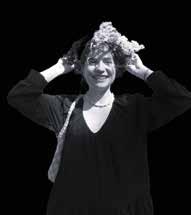










Stories of Students Relocated from Afghanistan, Russia and Ukraine to Bard College
Edited by Zarlasht Sarmast



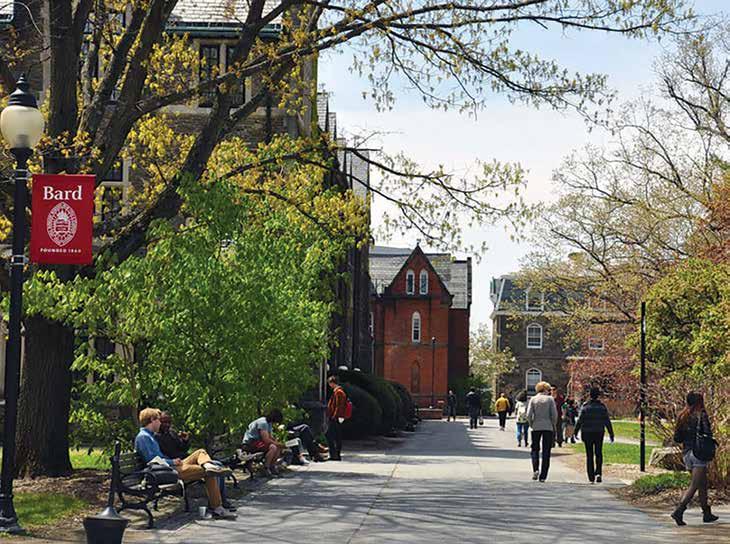
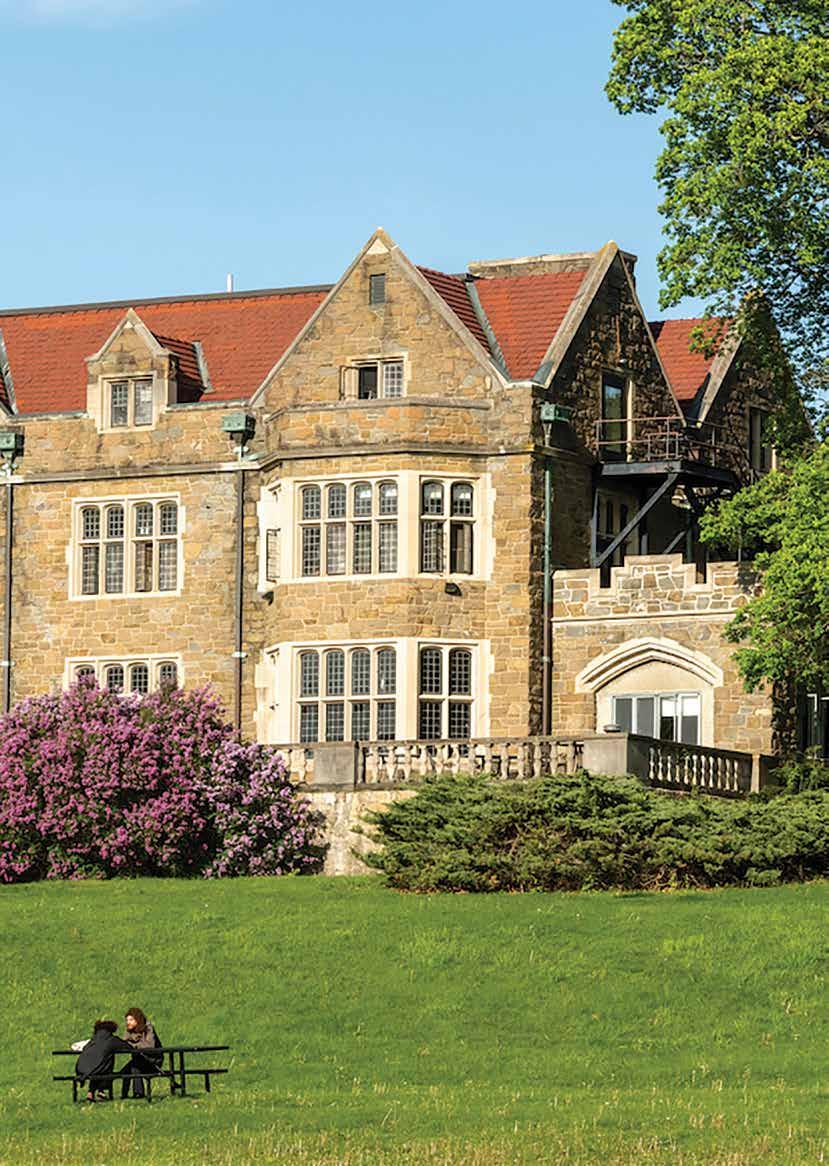
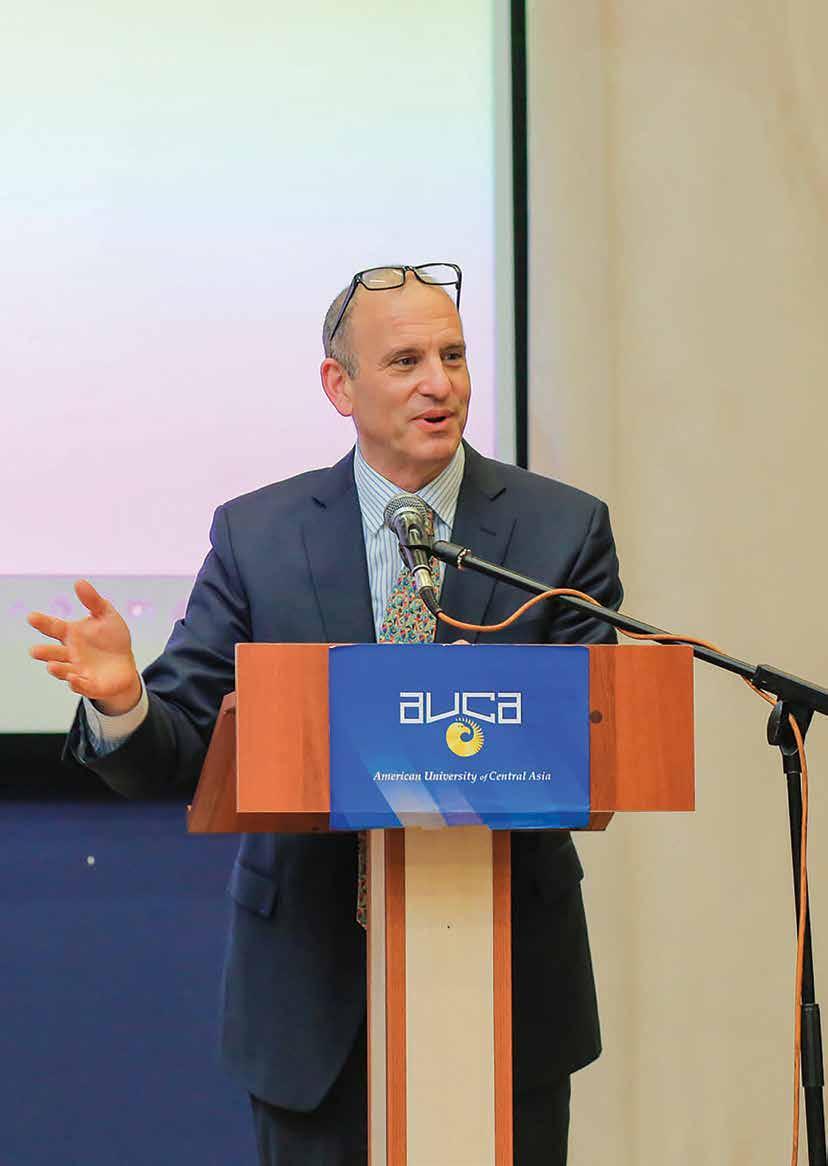
Colleges and universities are institutions of learning, but also civic actors with the capacity to use their authority to mobilize intellectual, political, and financial resources to help address challenges that impact their students, particularly those concerning access to education. At Bard College educating those affected by displacement is not just part of our civic mission, nor is it do-gooderism; engaging with inspiring and talented young people enhances the educational environment and classroom experience of all matriculated students.
Bard College has a long history as a sanctuary and refuge for vulnerable populations. Beginning in the mid-1930s and throughout World War II, Bard gave refuge to distinguished writers, artists, intellectuals, and scientists fleeing Europe. In 1956, it became a haven for 325 Hungarian student refugees following their participation in Hungary’s revolt against the Stalinist government. Since the 1980s, Bard has brought scholars at risk from Africa, Eastern Europe, and the Middle East to teach and do research in Annandale-on-Hudson. And the Bard College Berlin Program in International Education for Social Change has actively reached out and enrolled refugees and other young people impacted by the ongoing crises in Syria and Greece, among other places.
The stories that follow describe efforts to bring students from Afghanistan to the American University of Central Asia (AUCA) in Bishkek, Kyrgyzstan during or at the height of the fall of Kabul. AUCA is our long-term partner and AUCA students are Bard students. But Bishkek was only part of a longer journey. There were many students from other partner institutions, including the American University of Afghanistan, who were dispersed across the globe to continue their education. Some made it to the US, others to the American University of Iraq in Sulaimaniya, and some to third countries. During these hectic days our work took on a life of its own. We opened the doors of Bard College Annandale, Bard College Berlin, and Bard College at Simon’s Rock to the students out of a sense of moral responsibility and also because we believed that for these students, the chances of a successful transition to the US would be enhanced if they could complete their education and adjust to American life from the safety of a college campus. We also hoped our efforts could serve as a model for other academic institutions in the US to follow suit and step forward to open their doors. The postscript to the piece below will describe that.
Our steps to help students from Russia and Ukraine followed a similar logic. Just before our efforts in Afghanistan, Smolny College, Bard’s long-term dual degree program in partnership with St. Petersburg State University and Russia’s first liberal arts institution, came under assault. Bard was the first higher education institution to be declared an “undesirable organization” in Russia and was deemed an “enemy of Russia’s constitutional order.” With the Russian escalation in Ukraine, and further steps that effectively eviscerated Smolny, we again sought to open our doors to our students at partner institutions. The extension of the offer to displaced students from Ukraine was only natural, and for me, who taught in Ukraine at the University of Kyiv-Mohyla Academy in its first year of operation in more than a century in 1992-1993, it was a welcome step. We are now looking to transform our sanctuary program into its own entity, benefiting the many displaced students from our partner institutions who are being deprived of education, as well as others in the world who find themselves at risk. Bard is, however, limited in what it can do. We are a small and underfunded institution. We still hope that others will step forward and fulfill their function as responsible civic actors to assist displaced students. It is for this reason that Bard is helping to spearhead the UNHCR’s 15 by 30 Roadmap initiative, which strategizes actions aimed at increasing enrollment in higher education for young refugee women and men to 15% by 2030. There is a long way to go, but we hope that Bard’s example, and the positive impact displaced students have had on our community, will help to realize that goal.
I have worked with Afghan students for many years at AUCA, where I am a board member and was Interim president from 2021 - 2023, a position I also held in 2018-19. Afghan students are also active participants in civic engagement activities within Bard’s undergraduate liberal arts network, and many AUCA and AUAF students enrolled in the OSUN online courses I co-taught last spring and summer.
My involvement with planning for new support for Afghan students began in June 2021, even before it was clear that an evacuation might be needed. The U.S. had reaffirmed its plans to leave Afghanistan in April. While there was a general belief that there would be a difficult postU.S. transition, the view expressed by many “experts” was that the government could hold out at least a half year, and likely longer. At that time, I approached Alex Soros and other leaders in OSUN about setting up a scholarship program to welcome back Afghan graduates of AUCA BA programs into its MA programs. Alex responded positively, and almost immediately we set up an Afghan response team at AUCA consisting of such major offices as International Affairs, Alumni Affairs, and Academic Affairs, to be responsible for outreach and planning, and brought in staff at Bard College to help with logistics.
We were moving ahead with advertising graduate programs for alumni of AUCA in early July, when events in Afghanistan accelerated. I taught an OSUN summer course on civic engagement which had a number of Afghan students enrolled, and they reported on Taliban advances, including attacks on their homes and those of friends and loved ones. A journalist friend with great experience in the region, George Packer, warned me that time was shorter than estimated (although even he was ultimately surprised by the speed of the Taliban takeover). He advised me to read Thurston Clarke’s book, Honorable Exit, about the end of the Vietnam war, which focused on efforts by Americans to evacuate Vietnamese friends and colleagues in the weeks and months leading up to the U.S. exit from the country.
Clarke’s book vividly demonstrates the most important lesson that shaped our approach to assisting Afghan students throughout: determined people have the capacity to influence outcomes. In a class on civic engagement taken by many Afghans, we teach that individuals have agency; they are not simply beholden to forces beyond their control. More specifically, Clarke demonstrated that in chaotic moments such as military retreat, you cannot rely on governments, particularly senior officials, who have their own priorities. Instead, you must take control of your own fate and that of others about whom you care. This might mean working with mid-level government officials willing to ignore their superiors, as Clarke wrote, or civil society networks, as we discussed in my Civic Engagement class. Clarke made clear that in order to succeed in such chaotic times, you need to be prepared to improvise, take risks, and refuse to be deterred by authoritative voices telling you something is impossible, because passivity leads to failure. You need to try multiple approaches and be willing to take steps without knowing for certain what comes next. Moreover, you cannot not be deterred by failure. Clarke offers a sober reminder of what was at stake by tracking the lives of those who were evacuated and those who were not. Sadly, we had a glimpse of this a year earlier, in the summer of 2020, when AUCA graduate Fatima (Natasha) Khalil was murdered in Kabul while she was working for the Afghan Human Rights Commission.
In early August, as the Taliban swept across the country, we were acutely aware that if they took power it would have tremendously negative consequences for the well-being of our graduates and the educational futures of all Afghans, especially women, who constituted a majority of our students. The first several weeks of our work, from mid-August to early September, were largely unsuccessful. Not only had we been unable to get our graduates out of the country, but some of our undergraduates who had yet to leave Kabul had flights canceled and were now stuck in-country. Twice in the waning days of the American presence we and our partner, the American University of Afghanistan (AUAF), had students on buses ready to go to the airport, but both times we could not get permission from senior U.S. authorities to gain entry, so both trips were abandoned. When the Pentagon announced that the last U.S. troops had departed Afghanistan,
we had not evacuated a single student. It was extremely disheartening. We had spent two and a half weeks with little sleep, contacting government officials who were unable or unwilling to offer assistance, trying to procure access to buses and airplanes at usurious rates from merchants, and exploring details of various border crossings.
Following the departure of the U.S., we adjusted our approach. Instead of seeking flights of large numbers of students from Kabul, we shifted to a piecemeal overland strategy to get students across the Torkham border into Pakistan, where the Pakistani government allowed students with legitimate educational plans to cross. To do this successfully, we needed several things: a letter from the Pakistani Ministry of Foreign Affairs providing students the right of passage, ground transportation to the border and then to Islamabad, accurate communication with students to organize groups and meet-up points, and visas to get students from Pakistan to Kyrgyzstan. Nothing was easy, but we solved each issue as it arose. OSF’s inimitable Omar Waraich, the chief architect of the strategy, opened up communications with the Pakistani foreign ministry, where a kind mid-level official issued approved lists to allow students to enter the country. A Finnish security firm, which was recommended by OSF, arranged ground transport that could navigate around and through Taliban checkpoints. Bryan Billings from Bard College became the master of maintaining accurate lists of students and coordinated between the security firm, Omar, AUCA, and me. AUCA’s International Office, led by the tireless Aselia Umetalieva, kept in close contact with students to arrange the difficult and ever-changing tasks of coordinating departures and meet-up points, aided extensively by Zarlasht Sarmast, an OSUN Civic Engagement Global Fellows Program Coordinator, who is Afghan and who knows Kabul. Chingiz Shamshiev from AUCA worked with the Kyrgyz Foreign Ministry, which had taken the bold step of opening up 500 student visas for Afghan students, to secure visas for students.
To get students to safety in Kyrgyzstan, each one of these steps needed to succeed, and for each of these major steps there were hundreds of other things that had to occur. But the plan worked. In groups of 9 to 18, divided into cars of 4 and 5 people, we were able to get students from Kabul across the border and into Pakistan. In all, we ran ten cross-border runs over a twelveday period, of which nine were successful.
OSUN was created with the belief that a network of institutions cooperating with each other can generate resilience, and that is what we witnessed. Every day and night we had a team consisting of people from AUCA in Bishkek, Bard College in New York, OSF in Amman, and the security firm in Helsinki, who were spread between Afghanistan, Pakistan, and Finland, working together and coordinating with student leaders on the ground. We were at times joined by representatives of AUAF, who were spread across the globe at Bard College Berlin and OSUN’s Refugee Higher Education Access Program. And for each person I named above from these institutions, there were many others who helped along the way, particularly from AUCA and OSF.
It was not easy. Many of us had little sleep for weeks on end. Sometimes we could not secure them visas and students, faced with the difficult choice of leaving friends and family behind, backed out at the last minute. Some students failed Covid tests and were forced into quarantine in Pakistan. On the third trip, a large group of 17 was turned back at the border and some students were beaten by the Taliban. The entire group had to return to Kabul and we debated giving up the land route, but decided to try again a few days later with a small group and succeeded.
After the land border became too difficult, we were able, through Omar again, to work out an arrangement with Pakistan International Airlines to secure visas and flights for groups of students to Islamabad. But this involved getting visas from the Pakistani embassy in Kabul, which was extremely challenging. Perhaps the lowest point of the entire endeavor occurred on our first attempt to get visas at the embassy. A student volunteer, who was carrying passports of around 20 students, had been confronted by a Taliban guard and suddenly fell silent. We feared that if those passports were confiscated, we would have lost their opportunity to leave and would be responsible for their fate under the Taliban. Fortunately, although it turned out the student had been struck by the guard, he had not been injured or detained and with the help of AUAF transporting students to the airport, we were able to evacuate an additional 63 students on three flights.
Getting students out of Afghanistan to Pakistan was the most important part of the journey. But we still needed to get students to Bishkek. We struggled to find flights out of Pakistan, which were almost entirely booked. Yasin Yaqubie from OSF spent days negotiating a special charter to fly our students from Islamabad to Bishkek even while we were still evacuating others. Then, as if the Red Sea were parting, we discovered a series of charter flights along the same route that were primarily taking Pakistani medical students to study in Kyrgyzstan, and we were able to secure seats for our students. Having secured student visas, the students could finally proceed to Bishkek to re-start their education as we had hoped when we began our efforts in June.
Looking back, perhaps my most vivid memory was of one night towards the end of our overland efforts, when a group of 18 students was delayed at the border for many hours. They could not get across and there were reports of shooting in the area. I was on my back porch the entire night, talking and texting with colleagues who were based in six countries, reaching out to Pakistani officials, trying to calm students, and deciding whether or not to abandon the mission. The relief and emotions I felt when they crossed was comparable to two other pivotal moments: when our first group of students made it into Pakistan, and when the first plane of students arrived in Kyrgyzstan. My feelings were shaped by the painful failures that had taken place in the first weeks of our efforts and by the knowledge of how important these efforts were to the students’ futures. In addition, there is a transcendent feeling of grace that comes from being part of a team whose members are willing to give of themselves so absolutely and selflessly. More than once I found myself wiping away tears, overwhelmed by the magnitude of the work and the gratitude I felt for my colleagues’ efforts.
In October, I flew to Bishkek and met with many of the evacuated students in person. Some I had known from the online classes I had taught, or from civic engagement conferences and workshops I had participated in, and some I only knew from texts and lists of names. It was incredibly gratifying to see their faces and hear their stories. One student in particular was held by the Taliban for a few weeks after she had attempted to cross at Torkham with a British group. Seeing her there with her sister, with whom I had been in touch throughout her travails, was otherworldly. This joy, however, was tempered by the knowledge that while we were able to get out almost all students who joined our evacuation efforts, many of our alumni did not make it out due to family concerns. The fact that there are also many students who still have family and loved ones suffering in Afghanistan is also sobering.
In all, we evacuated 177 students from Afghanistan in nine overland trips and three flights. Many were AUCA students and alumni, others AUAF students who wanted to complete their education, and still others from partner institutions, like the American University in Beirut. Nearly all of them, and several additional students who found themselves in third countries, went to Bishkek to continue their studies. Their journey is not over. We are now working through OSUN and foundations and universities in the US and Europe to secure the longer-term future for the students until a time comes when they can return home. But for now, we can celebrate that they are safe and that we were able to accomplish what we set out to do.
The idea of bringing Afghan students to Bard was a part of the natural evolution of helping to evacuate students from Kabul to Bishkek. As the story above tells, many people from Bard were involved in helping students from Afghanistan exit after the Taliban takeover. We first started working with the American University of Central Asia (AUCA) , a dual-degree partner, and then other partner institutions, first and foremost the American University of Afghanistan (AUAF). But that is only part of the story. In the early days after the fall of Kabul, Bard took in some Afghan students who had managed to navigate their way to the U.S. Moreover, for the students we helped evacuate, AUCA in Bishkek was only the halfway point towards completing their education and helping to build a more stable future. The same was true for other AUAF students who had been evacuated to the American University of Iraq in Sulaymaniyah, Iraq.
Since the evacuation from Kabul to Bishkek, we have worked with many institutions, including Education Above All in Qatar, the Yalda Hakim Foundation, the Institute for International Education, the Afghan Futures Fund and Schmidt Futures to help eligible students transition to the United States by supporting their education through enrollment at U.S. higher education institutions. After a long wait, these students have been coming in waves, and to the extent that Bard can welcome them we have.
This entire process has been daunting. We need to acknowledge that the displacement of students from their homeland, and in many cases, the separation from their families, has been challenging and traumatic. At Bard, we have done our best to learn how to support such students, but we are still learning.
The presence of students from Afghanistan, Russia, and Ukraine has added tremendously to the academic environment at Bard. We hope, as we did when we began this process in the summer of 2021, that our efforts will help these talented young people complete their education and provide them with a robust and sound foundation as they make their way towards what we imagine will be a better future.
“Our Journey to Bard” is a continuation of the themes of the photo story book “Our Journey from Kabul to Bishkek.” This book includes the narratives of students from Afghanistan, Russia, and Ukraine, who had to leave everything behind in order to continue their education and find a better future.
Since the withdrawal of US forces from Afghanistan during the summer of 2021 and since the beginning of the war between Russia and Ukraine in the fall of 2022, Bard has offered academic opportunities for over 130 students from Afghanistan, Russia, and Ukraine. Bard College has supported relocated students through tuition scholarships, and covering expenses such as room, board, textbooks, medical and legal assistance. In the summer of 2021 the administration of the American University of Central Asia (AUCA) in Kyrgyzstan developed a strategy with the Open Society University Network (OSUN) to provide scholarships to Afghan graduates. AUCA has had a large contingent of undergraduate Afghan students for the past decade, thanks to scholarships provided by the US Embassy in Kabul/US State Department and Open Society Foundations (OSF). The new scholarships were envisioned as a means to provide additional opportunities for graduates, as Afghanistan faced an uncertain future. In the final weeks of August, AUCA, the American University of Afghanistan (AUAF,) the US State Department, OSUN, OSF, Bard College and Bard College Berlin (BCB) worked together to find safe passage from Afghanistan for students from AUCA, AUAF, the American University of Beirut (AUB), and the OSCE Academy in Bishkek. With the support of OSF, the Kyrgyz and Pakistani governments, working with a Finnish security firm and a dedicated team located across the globe (from Bishkek, Islamabad and Kabul to Amman, Helsinki, and New York) worked tirelessly for two weeks to transport 114 students across the Pakistan border. Throughout the evacuations, no one was seriously injured, fell seriously ill, or was a victim of a crime. Now three years later students are thriving, getting involved in their surrounding community, navigating a new academic experience, and making plans for the future.
Similarly, in fall of 2022, Bard college announced a scholarship program for 60 Ukrainian and Russian students who were displaced, under threat, or not able to continue their education as a result of the Russian invasion of Ukraine. This program was aimed at individuals impacted by the war and designed to allow students to begin or continue their undergraduate education. Students were admitted to Bard College’s main campus in Annandale-on-Hudson, New York, and its affiliates in New York City, Bard College Berlin, or Bard College at Simon’s Rock in Great Barrington, Massachusetts.
Bard College remains committed to supporting relocated students as they integrate into their new lives in the United States, ensuring they have access to comprehensive resources, mentorship programs, and cultural immersion opportunities to thrive academically, socially, and personally. These are some of the stories of the brave students who made the journey to Bard from Afghanistan, Russia, and Ukraine. Although edited for brevity, each story is in the teller’s own words.
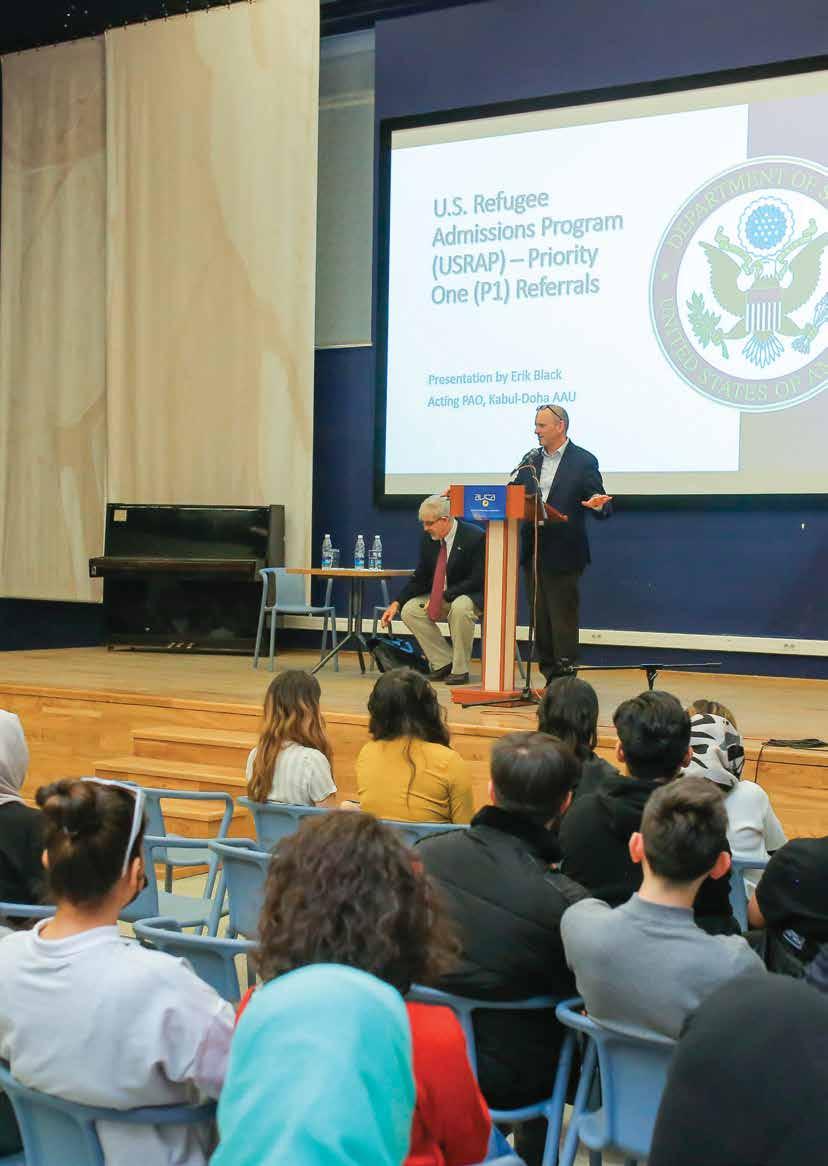
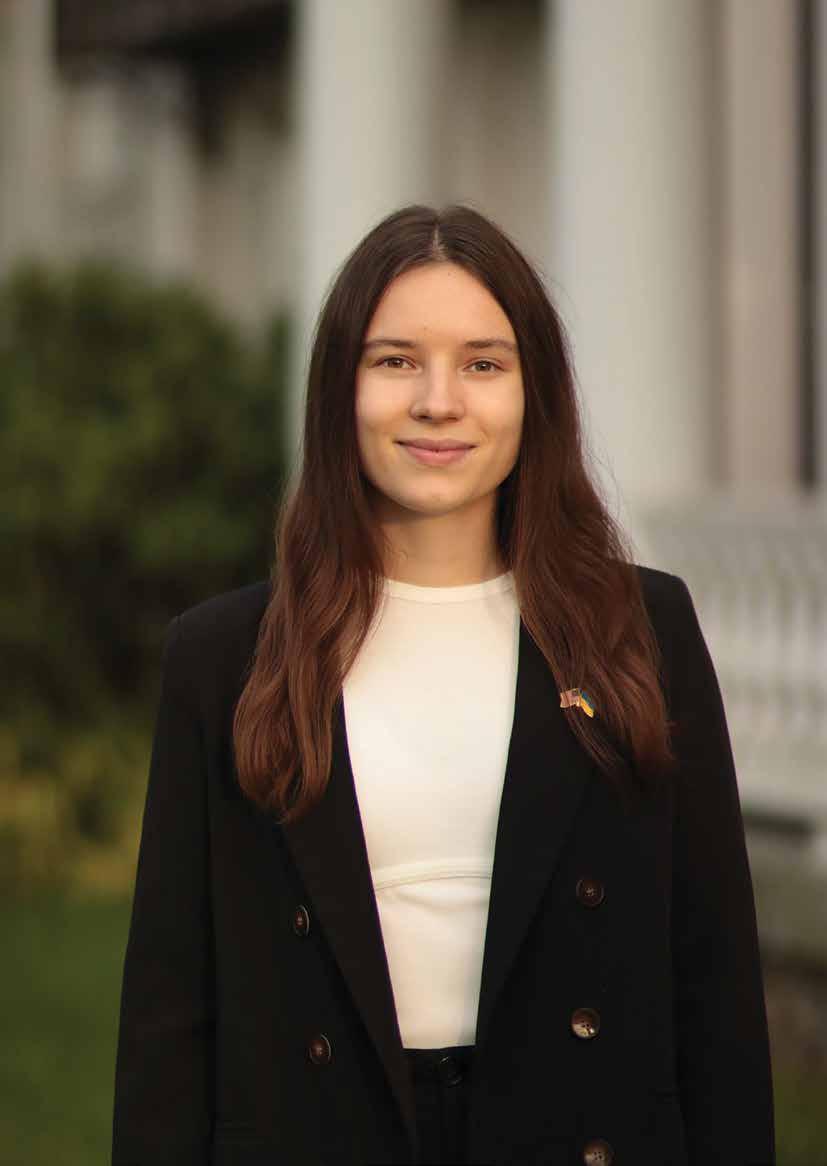
One Saturday in October 2022, I woke to a loud explosion that made my house shake. A Russian missile, one of many designed to attack critical Ukrainian infrastructure, had landed 1.5 miles from my home in Rivne, some 200 miles west of Kyiv. As a result of such attacks, for the months to come, we typically did not have electricity for 10 hours a day, sometimes even longer. I gave myself a new name: “electricity hunter.”
Due to the constant risk of attacks by Russia, the university at which I was enrolled as a third-year law student, National University of Ostroh Academy, had moved its classes online. But frequent electricity blackouts meant no internet access and disrupted mobile connections. Without heat or water, it was impossible to study. The blackouts happened regularly. Even attending virtual online classes became a challenge, as many students and professors lived in different cities, and the timing of power outages was variable and inconsistent across them.
Frequently, in order not to miss a class, I had to leave my home early and look for a cafe with a generator that would provide electricity for the course period. This tactic did not always help, though, because sometimes the generators stopped working right in the midst of class, or there were so many people angling for a connection that internet access was slow. At times during the day, I had to change study locations several times. At other times, classes were interrupted because the air raid alert sounded, and we had to rush to a bomb shelter until the danger of shelling ended.
Therefore, when I saw the announcement of the Emergency Ukrainian Student Refugee Program, an initiative of Bard College, I was so excited at the idea that I might be able to continue my studies in calm conditions, with winter heat, without flinching from every loud sound, and without my parents having to worry about my safety. I could say farewell to the constant need to hide in a bomb shelter and to the ever-present anxiety about whether there would be enough water and food at home in the event of the next missile attack.
I worked on my application at night and, on Nov. 19, 2022, I took the Duolingo English test online at 3 a.m. Why so early in the morning? There was less chance of a missile attack, and electricity access was more stable. I was incredibly relieved when I finally completed the test; when I woke up at 8 a.m. the same day, we had no electricity and no internet once again, and no one could predict when it would return.
I was so happy to receive an acceptance letter in March to join Bard as a junior in August. With the start of the full-scale invasion, I lost the ability to plan for more than two weeks at a time as everything became so unpredictable. We
couldn’t even know what would happen in the next hour. It was such a relief to have a clear understanding of the foreseeable future and to know and be grateful that I could continue my studies in the United States in safety.
Education is an extremely important tool for empowerment and post-war reconstruction efforts. Currently, there are 23 Ukrainian students at Bard. Many of us are not only trying to get the most out of our classes but are also engaged in advocacy for Ukraine. Back in July 2023, while I was in Ukraine, I looked at the list of student clubs at Bard and did not see any related to Ukraine. I thought it might be a great idea to create one.
I wrote to Maria Sonevytsky, a Ukrainian-American professor at Bard, and she supported the idea. As a result, when I arrived at Bard, Prof. Sonevytsky and I met with several other students and discussed our views, and that’s how the Ukrainian Solidarity Club at Bard came to be. It is based on three main pillars: social, cultural, and activist. It is a place for Ukrainian and non-Ukrainian students alike to come together to cultivate cultural engagement and community, to learn about Ukrainian culture, and to participate in events inspired by the Ukrainian language, traditional crafts, food, music, and more. In addition to social and cultural events, Bard’s Ukrainian Club is an organization working towards spreading awareness about the Russian invasion of Ukraine, holding charity events to help Ukrainians, and developing projects aimed at post-war reconstruction.
We decided to organize the first event about Ukraine in August before the semester even started. We wanted to celebrate Ukraine’s Independence Day on Aug. 24 in an uplifting spirit. Professors Sonevytsky and Masha Shpolberg helped us a lot. We were thrilled to see almost 40 students attend our event even before students returned to campus for the fall term. At the fair where the team first presented the club, more than 80 people signed up to become members of the community of Ukrainian solidarity. We held numerous events introducing people to Ukraine, highlighting the Russian aggression against Ukraine that has been going on since 2014 following the Revolution of Dignity, where individuals fought to preserve Ukraine’s democracy, express the desire for a sovereign European country, and resist falling to Russia’s quiet occupation. I also had the opportunity to represent our club at various events in collaboration with Bard’s Center for Civic Engagement.
At Bard, I study human rights, and in the fall, I took the Human Rights Advocacy class taught by Ziad Abu-Rish; we discussed and learned effective advocacy tools. One of my main insights was that advocacy works best in combination with different approaches, such as public lectures and speeches, petitioning, media usage, publications, protests, and more. Thus, our advocacy extends beyond campus. In October 2023, as the club head, I had a chance to gain hands-on experience as an advocate for Ukraine at Congressional meetings on Capitol Hill. The American Coalition for Ukraine held the third Ukraine Action Summit in Washington D.C., with over 500 people coming from 36 states.
While in D.C., we met with elected officials and advocated for continued U.S. support for Ukraine. The delegation of which I was a leader had a meeting with the legislative assistant from the office of Rep. Pat Ryan (D-18). Among the target
pieces of legislation was the Genocide Resolution (H.R. 154), and the Rebuilding Economic Prosperity and Opportunity (REPO) for Ukrainians Act (H.R.4175) that would allow the use of Russian state assets frozen by the United States to reconstruct Ukraine. Since Russia has kidnapped thousands of Ukrainian children, also advocated for the support of the Forced Transfer of Children Resolution (H.Res.149), condemning the illegal abduction of children from Ukraine by the Russian Federation. Among others, I also invited Pat Ryan and his team to our Ukrainian Solidarity Club events at Bard where we use other advocacy tools. Also, thanks to Bard’s support, in October, a group of students had the opportunity to attend the Summit on Human Rights and the Global Assault on Democracy at the University of Connecticut, featuring, among others, discussions on accountability for atrocities in the war and memory preservation in Ukraine. Participating in this event were prominent lawyers, scholars, human rights activists, Kyiv’s deputy mayor Konstantin Usov, and CEO of Babyn Yar Holocaust Memorial Center Oleksiy Makukhin, among others. It is important to note that this memorial was damaged by the Russian missile that struck the main TV tower in Kyiv in March 2022. The keynote was delivered by Oleksandra Matviichuk, who was awarded the 2022 Nobel Peace Prize.
This experience allowed the students to gain profound insights into the potential future of Ukraine. In addition, when our club organized a fundraiser to help Ukraine at the end of the fall semester, with the help of students and faculty, we raised more than $300 and sent it to Razom for Ukraine, a non-profit organization based in the United States that is committed to the goals of the Maidan or Revolution of Dignity of February 2014, when Russian forces invaded the east of Ukraine and annexed Crimea.
The journey from being an “electricity hunter” amidst the war in Ukraine to finding a safe space and continuing my education at Bard has been transformative. The creation of the Ukrainian Solidarity Club stands as a testament to the resilience of the more than 20 Ukrainian students at Bard, bridging cultural gaps and advocating for our homeland. Beyond campus borders, our advocacy efforts have reached the U.S. Capitol. It is important to add that critical aid to Ukraine has been stuck in Congress for several months. Therefore, we also advocate for people to contact their senators and urge them to vote to support this aid. It usually takes no more than one minute to leave a phone message, but it is a crucial step in protecting global security. Standing together in support of Ukraine strengthens our shared commitment to global democracy. By supporting Ukraine, we uphold the values of freedom and justice, showcasing the resilience of nations united against aggression and authoritarian regimes.
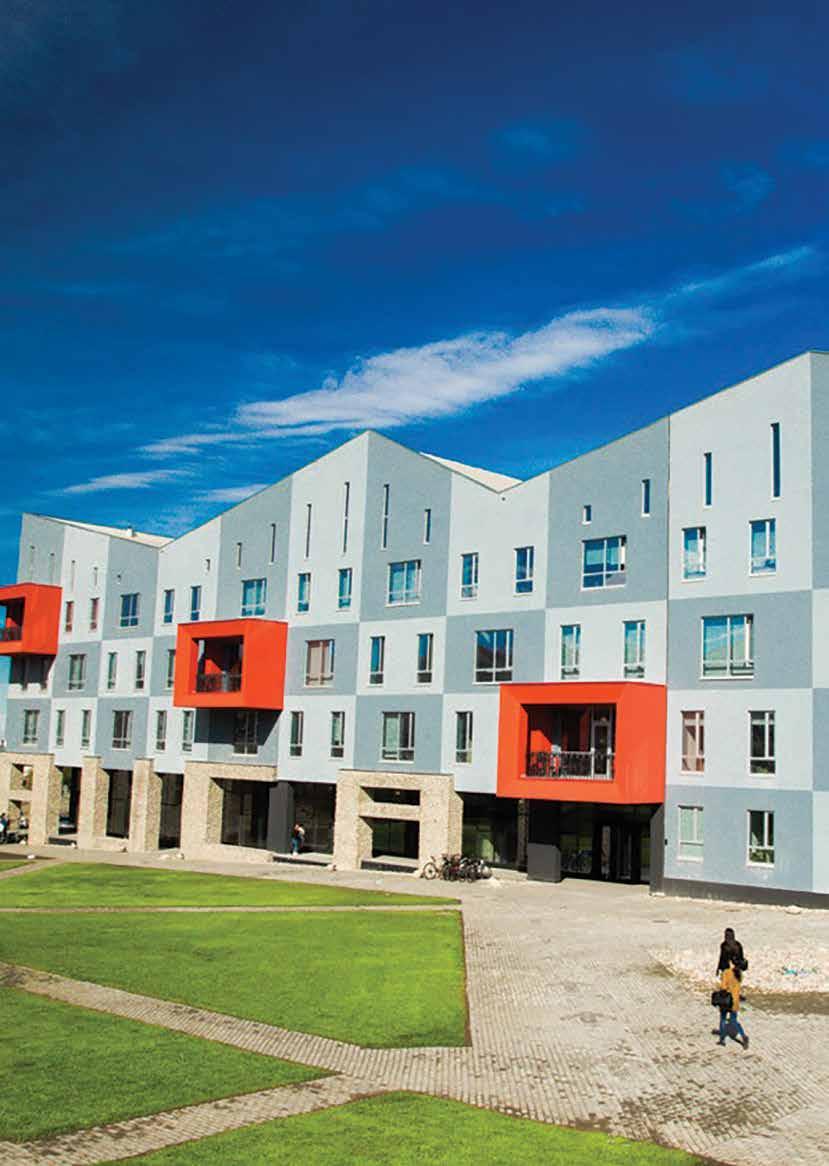
Iam a graduate student pursuing an MSc in Economics at the Levy Institute of Bard College and my undergraduate study began at the American University of Afghanistan in 2019, which I continued at the American University of Central Asia following evacuations. I earned my BBA with a Finance concentration in 2021.
The day before I had to leave Afghanistan was intense and emotional. I was in Kabul with my family, surrounded by the chaos and uncertainty that filled the city as the government collapsed. We spent the day together, trying to cherish every moment, despite the overwhelming sense of anxiety about the future. The decision to leave wasn't easy, especially knowing I'd be leaving my family behind. But I was driven by the need to continue my education, a dream that seemed impossible amidst the turmoil back home. The air was heavy with a mix of fear, hope, and a deep sadness for all that was being left behind.
As I faced the heart wrenching decision to leave my home, a flood of thoughts and emotions washed over me. Foremost in my mind was my family—how leaving would affect them, the pain of separation, and the worry for their safety in a country on the brink of chaos. I grappled with guilt and a profound sense of responsibility towards them. At the same time, I was consumed by my hopes and dreams for Afghanistan. It pained me to leave it in such turmoil, feeling a deep connection to its future and a longing for the peace and prosperity that seemed so distant. Yet, amidst this chaos, I stuck to the hope that by pursuing my education, I might one day contribute to a better future for my country and reunite with my family. These thoughts swirled in a tumultuous mix of duty, love, fear, and hope.
My journey to Bard College was facilitated by a series of fortunate events and the support of various individuals and institutions. Initially, my education was sponsored by a scholarship from the U.S. Embassy for undergraduate studies at AUAF. However, after the collapse of the Afghan government, my academic journey was disrupted, leading to a transfer to AUCA as a temporary measure.
In Bishkek, Kyrgyzstan, I was enmeshed in a lengthy and uncertain immigration process that stretched over two years. It was a challenging period filled with anxiety and some hope. During this time, I received an Institute of International Education (IIE) scholarship, which opened the door to Bard College. This scholarship was a beacon of hope, offering me a chance to continue my education and pursue my dreams amidst the turmoil.
I remember a conversation with the AUAF advisors who were helping me prepare for my journey. They said, "This is more than just an education; it's a new chapter in your life, an opportunity to rebuild and contribute your
unique perspective to the world." These words resonated with me, reinforcing my determination to embrace this new path and the possibilities it offered.
The combined efforts of the US Embassy, IIE, AUCA and the welcoming community at Bard College, along with my own perseverance, made my journey possible. It's a testament to the power of collaboration, support, and the unyielding human spirit in the face of adversity.
Saying goodbye to my family when I first left for AUCA was one of the hardest moments of my life. The weight of leaving them, the elders who had nurtured me and the younger siblings who looked up to me, was immense. The air was thick with unspoken words and emotions, a blend of pride, sadness, and fear of the unknown. Each hug, each look exchanged, was heavy with the understanding that life was about to change drastically.
The second departure, leaving for Bard, meant saying goodbye yet again, but this time to the friends I had made at AUCA. These were the people who had become my family away from home, with whom I shared the struggles and joys of adapting to a new life in Kyrgyzstan. We had supported each other through the uncertainties and had grown together, making the thought of leaving them behind deeply painful.
As I prepared to leave everything familiar once more, I felt a mix of emotions. There was a sense of loss and heartache for the relationships and the life I was leaving behind, coupled with a feeling of trepidation about the unknown journey ahead. But amidst the sadness, there was also a thread of resilience and hope. I was determined to make the most of the opportunity at Bard, to honor the sacrifices made by my family and friends, and to carry forward the strength and love they had instilled in me.
The farewells were a distressing reminder of the many ties that bound me to my homeland and the people I loved. Yet, they also reinforced my commitment to pursue a brighter future, bearing the wisdom, memories, and hopes of those I was leaving behind. The journey to Bard was not just a physical transition, but an emotional voyage, carrying a piece of my home and my heart with me as I stepped into a new chapter of life.
My journey to Bard was a protracted and complex one, marked by anticipation, delays, and challenges. It began with studying online for the first two semesters due to the extended immigration process that kept me in Bishkek for two years. This period was filled with a mix of frustration and determination, as I navigated my graduate studies remotely, longing for the day I could join the Bard community in person.
Finally, in the Fall of 2023, the moment arrived for me to travel to Bard, albeit almost two months late due to ongoing immigration procedures. The delay added to the anxiety and excitement of the journey. As I traveled, I was overwhelmed by a whirlwind of thoughts. There was relief that the prolonged waiting was coming to an end, but also apprehension about integrating into the campus life so far into the semester. The uncertainty of how I would fit into an already established community and catch up academically appeared large in my mind.
Arriving at Bard, I was hit with a wave of overwhelming emotions. The real-
ity of being in a new country, far from the familiar streets and faces of home, was daunting. The campus was bustling with life, a stark contrast to the isolation of online studies. I found myself struggling to cope with the sudden change in environment and the academic pressures of being behind.
However, amidst these challenges, the support I received from the Levy Economics Institute of Bard College and its professors was a lifeline. They understood the unique difficulties I faced and provided invaluable assistance and encouragement. Their empathy and guidance helped ease my transition, allowing me to gradually find my footing in this new chapter of my life.
Throughout the journey, my thoughts were a mix of gratitude for the opportunities I had been given, determination to overcome the hurdles, and a constant reflection on the sacrifices made by my family and close ones. I was keenly aware of the responsibility to make the most of this experience, not just for my own future, but as a way to honor those who had supported me along the way. The journey to Bard was more than just a physical relocation; it was an emotional and intellectual pilgrimage, shaping me in ways I had never anticipated.
The campus was both beautiful and daunting, a physical representation of the new world of opportunities and challenges that lay ahead. The initial days were a blur of adapting to new schedules, understanding different academic expectations, and navigating social interactions. It was hard to cope with the pace and the pressure initially, especially feeling the academic lag of joining late and the cultural shock of being in a new country.
Now, as time has passed, things have gradually settled. The initial sense of being overwhelmed has given way to a steadier routine. The support from the faculty and fellow students at the Levy Economics Institute has been instrumental in this transition. Their understanding and assistance have helped bridge the academic gap and eased the social integration. I've become more comfortable engaging in the vibrant intellectual discussions and community activities Bard is known for.
I am now more immersed in academic life, catching up with my studies and contributing my unique perspective to the classroom. Outside of academics, I'm exploring the rich cultural and social opportunities that Bard offers, which helps in feeling more at home here. The journey has been challenging, but it's also been enriching, providing growth and learning opportunities at every step.
Overall, while the initial adjustment was difficult, the resilience and support systems have paved the way for a more settled and positive experience at Bard. I'm looking forward to making the most of the rest of my time here, with a focus on academic achievements and personal growth.
To all those who have helped me reach Bard College, from the depths of my heart, I extend my most sincere gratitude and appreciation. The support, guidance, and belief in my potential that I have encountered have been the bedrock upon which I stand today.
The generosity and commitment to education received from the Institute of International Education have opened new horizons for me. IIE has provided not just financial assistance but also hope and opportunity, for which I am eternally grateful.
The empathy, guidance, and unwavering support I have received from professors and staff at the Levy Economics Institute have eased my transition and enriched my academic journey. Professors and staff have been more than educators but also mentors and friends in a time of great need.
The love, sacrifice, and encouragement from my family have been my constant source of strength. Their belief in me has been unshakeable, and I am endlessly thankful for their support and the home they continue to provide in my heart.
I thank the American University of Central Asia for being a sanctuary of learning and growth. The education, friendships, and experiences I gained there were foundational to my journey. The vibrant community and commitment to students' well-being there have left an indelible mark on my life.
I’m thankful for Bard College and OSUN’s vision and dedication to creating a more inclusive and connected world. Being part of this network has expanded my perspectives and connected me with a diverse and dynamic community.
Everyone listed has contributed to my story, providing the pieces that have come together to help me navigate this significant chapter of my life. The support has not only impacted me but also inspired a commitment within me to give back and support others in their educational journeys. I promise to honor this investment by making the most of this opportunity and to carry the lessons and values instilled in me forward. I thank everyone for believing in me, for standing by me, and for lighting the path to Bard and beyond. Their roles in my story are cherished, and I look forward to the day when I can extend the same support and encouragement to others that you have graciously provided to me.
In closing, I'd like to emphasize the importance of hope, resilience, and the power of education. My journey from Afghanistan to Bard College is a testament to the strength that lies in pursuing knowledge and the profound impact of global solidarity and support. I wish for my story to serve as a reminder of the enduring human spirit and the bonds we create through shared values and collective aspirations.
Furthermore, I'd like to acknowledge the ongoing struggles of those still in Afghanistan and in similar situations around the world. Their stories are crucial, and their voices need to be heard. It's vital for the international community to continue its support and for each of us to contribute in whatever way we can to create a more inclusive and peaceful world.
Lastly, I look forward to the future with a commitment to contribute to positive change. I am grateful for every opportunity and challenge, as they have shaped me into who I am today. I am optimistic about returning to my country one day and helping to shape its future, inspired by the education and experiences I've gained and driven by a profound love for my homeland.
This book is not just my story; it's a narrative shared by many who dare to dream and strive for a better world. It's a call to action for each of us to participate in building a more just, educated, and peaceful global society. I give thanks to everyone who has been a part of my journey thus far.


Hello, I am Kateryna, or Katie as my friends here call me. Originally from Donetsk, Ukraine, I arrived at Bard in Fall 2023 as a first-year student with an interest in pursuing a degree in Computer Science and Psychology. Currently, I’m taking different classes, driven by the belief that now is the best time to learn new things and discover my passions. Outside of academics, I find joy in singing, designing, scrapbooking, calligraphy, and photography. My biggest dream is to make a meaningful impact in the world by doing what I truly love.
I still remember the day I left Ukraine as if it happened just yesterday. And let me just say: trying to fit your entire life into two suitcases is not an easy task. Fortunately, I was blessed with the support of my amazing aunt and cousins as they were there for me the whole day to help pack. I spent the summer with them in Germany, which meant I had to say goodbye to my mom, dad, and brothers in May, long before leaving for college. Struggling to hold back tears, I hugged them goodbye, not knowing when I would get to see them again.
The day before my departure, I was running around the house, meticulously checking things off my packing checklist. As the night settled in, the list was completed, and the suitcases finally packed, the reality of my upcoming departure hit me like a wave. “Tomorrow, I’m leaving for college, to a different country, all alone.” I struggled to wrap my mind around it. It just didn’t feel real.
That night, there were two sides of me: one eagerly waiting for the upcoming adventure, counting down the hours to my flight, and another gripped by fear. Doubt was creeping in: “Am I making the right choice? What about my family? Are they going to be okay?” My mom always taught me that the most important decisions in life are often the hardest ones to make. Now I can confirm that it is true. When the alarm finally rang at 4 a.m., I knew the moment had come – a new chapter in my life was about to begin. Bard came into my life unexpectedly, almost as if it was a sign. After many attempts to connect with colleges about displaced students scholarships, I was about to give up. Then, one day, I stumbled upon a website that featured a list of educational opportunities for Ukrainian students. I clicked on one and discovered the Bard Student Refugee Program — less than a week before the application deadline. Recognizing it as a chance, I decided to apply.
The journey to Bard wouldn’t have been possible without the support of my family. In moments of self-doubt and confusion, they were always there for me. I remember having a conversation with my mom about my decision to leave. I asked her if she was upset, and she responded with a soft smile, “It’s hard for me to let you go so far away alone. And there will be many sleep-
less nights for me worrying about you and praying for you. But I want you to always remember that I am very happy and proud of you. You deserve the opportunity to receive your education, so don’t miss this chance.”
The actual journey began with a long trip from Donetsk to Dusseldorf, Germany. Since the airports were not operating, I traveled for almost three days by bus, which took me to my aunt’s house. All visa processes were completed, and come August, I finally held a reserved plane ticket from Dusseldorf to New York. None of this would have been possible without the generous support of EducationUSA Ukraine Opportunity Funds+, who kindly provided me with a scholarship to cover my visa and travel costs.
As I reflect on this journey, I’m beyond grateful for all the opportunities life has presented and for every kind soul I met who helped me along the way. Bard, my family, and the supportive organizations that were there for me - each contributed to this chapter of my life, creating a narrative of strength, hope, and perseverance.
I was one of the first students to arrive on campus that day. It was noon, and with plenty of time ahead of me, I decided to dedicate it to unpacking and organizing my new room. However, the dormitory’s silence made me feel very lonely, so I decided to go outside and explore the surrounding area. Tall trees, beautiful buildings, and the calming hum of crickets brought back memories of the summers spent at my grandma’s village. Although I was in an entirely new place, there was this feeling of familiarity that I couldn’t quite recognize. I now know that it was a feeling of certainty, a sense of things finally falling into place. In that particular moment, the foreign became familiar, and a long-lost sense of certainty found its way back into my life.
Now, Bard feels like home. Here, I’ve discovered a community of amazing people who support me and are there for me whenever I need help. It’s truly a wonderful feeling to be in a place that offers safety and where I’m surrounded by like-minded individuals. Every day brings new opportunities, and I’m working hard to receive my education. Being here has not only given me a sense of belonging but has also become a transformative journey, shaping my perspective and changing my life in ways I never imagined.
Thanks to my dear family, to those who have been by my side since the very beginning, and to the incredibly kind souls I’ve met at Bard. Their support means everything to me. In a world where education has become a privilege for so many, I am profoundly grateful for the opportunities the Emergency Ukrainian Student Refugee Program provided for us. The support has not only made education a reality but has also brought hope and strength during challenging times.
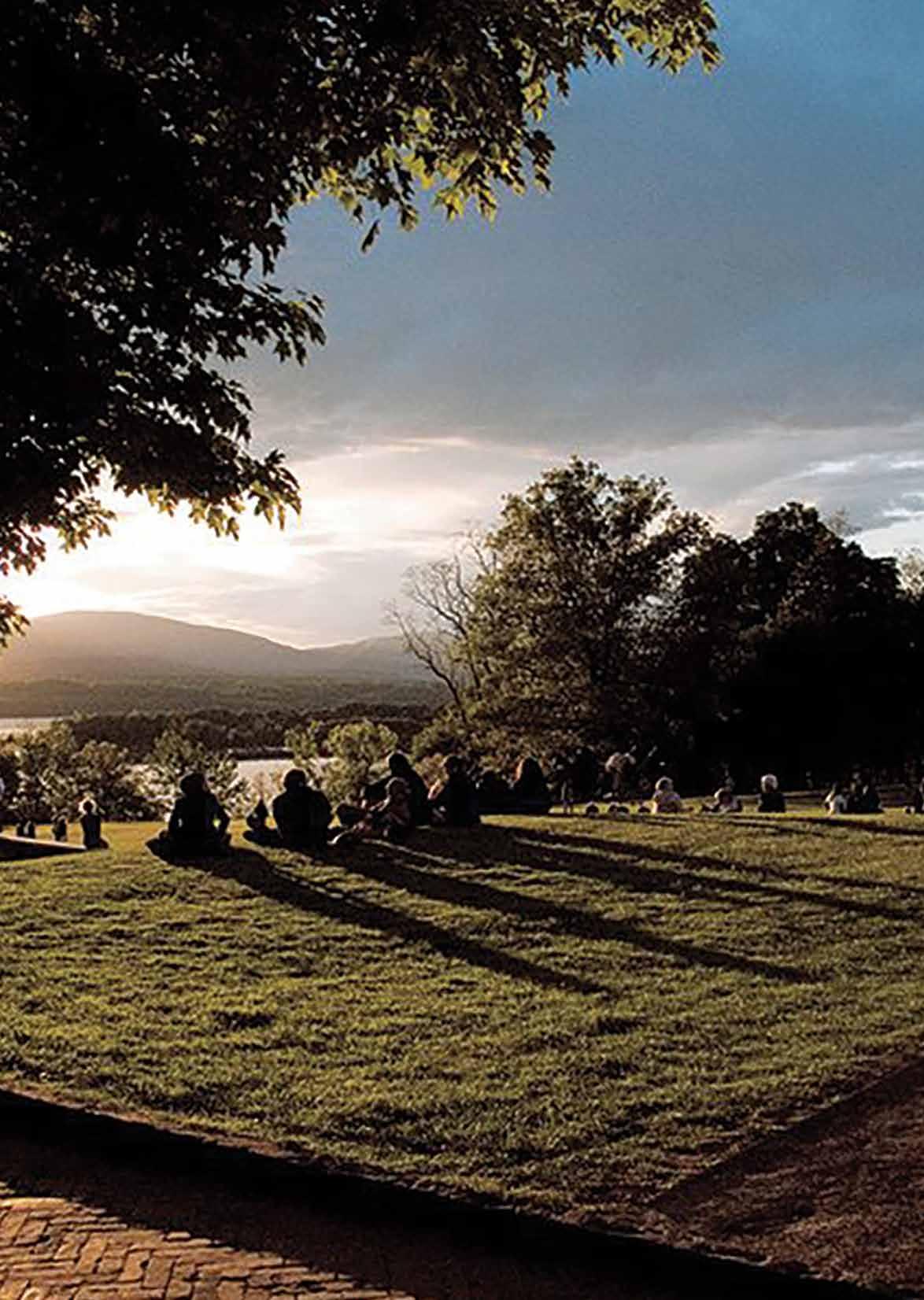
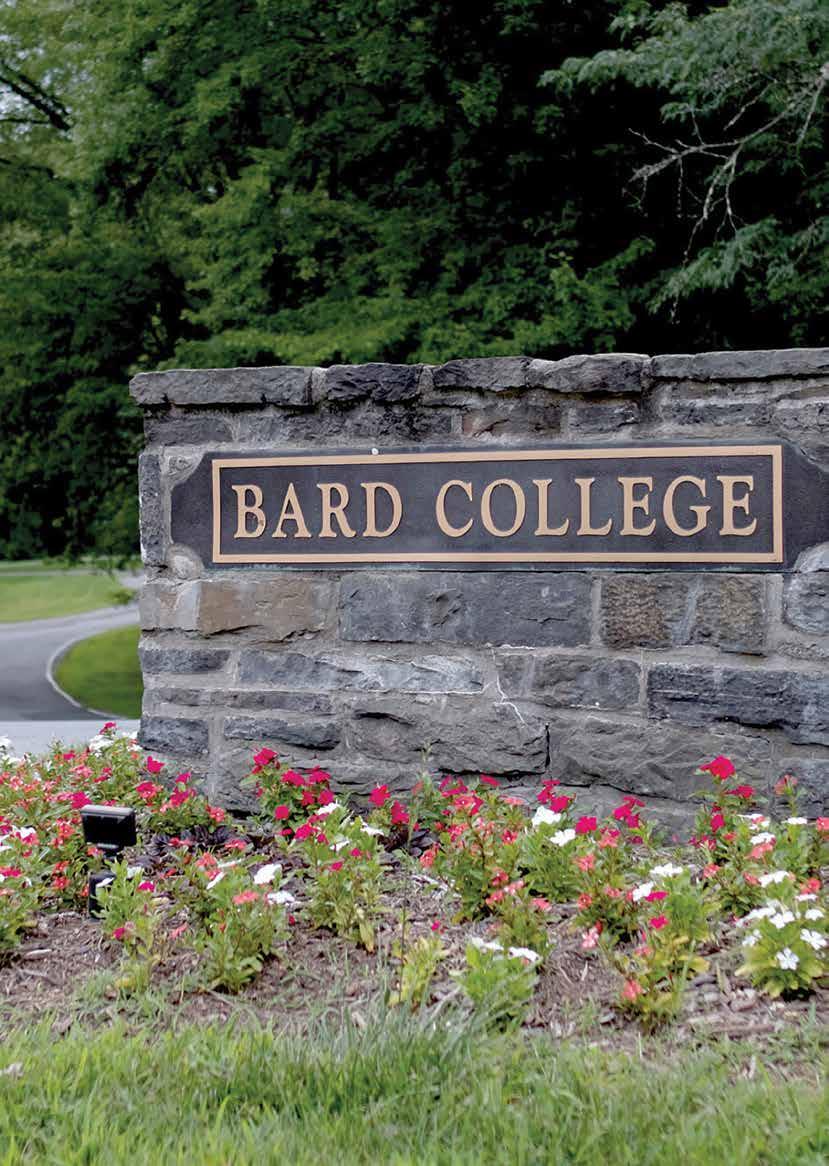
Idon’t know where to begin with this, really. Everything was okay. I had a job, I was going to university. I loved my daily routine. I would wake up early in the morning, do my morning prayers, make some coffee and get ready for the day. I had just started working as a receptionist in a private university, I was working the morning shift and after work, I would attend the American University of Afghanistan, where I had just secured a scholarship. Sometimes we would go to all the new coffee shops that were in Shar-e to meet with friends and hang out and get coffee. I think those were the best times of my life.
It was in July when things started to get bad. The Taliban started to take over a few of the provinces. They were getting closer and closer to Kabul. But still, I never thought they would just take over the whole country that quickly. Before things started to fall apart, we were all very excited because we were thinking that we would go back to university in person after the COVID period and see our classmates. But none of that happened. I think it was in the early weeks of August when things started to get really bad and my father actually told me to stay home unless it is something really serious. It was mid August when the Taliban took over the entire country. The president fled. Everything was just chaos.
Some of my friends from AUAF told me that if I go to the airport with some documents that prove that my life is in danger, the US army could help me get into one of the trains and get evacuated. I told my father about it and he agreed to take me to the airport. As we got closer and closer to the airport, there were more and more people, maybe thousands. Getting to the US army at the airport was not possible at all. So we came back home.
I was added to several group chats where people were helping AUAF and AUCA students get out of the country. In one chat, we were told we would be evacuated by land first and then we would get to Pakistan and from there to AUCA and then to the United States. I didn’t have faith that this would work but at that point in my life, I was ready to try anything and everything to get out of the situation that I was in.
There were two options for me: staying in a country with no education and consecutive dangers or pursuing my education and protecting my values. On Saturday at 7 a.m. we went to the airport and then flew to Islamabad. In Islamabad, we saw some famous city sites. It was nice and we were calm. Our families were happy. On October 8, we flew to Bishkek. It was all new for me—the people, customs, food, weather, everything.
I studied at the American University of Central Asia for two years and then my case was finally processed to come to the United States. I arrived in Bard in the middle of August this year and as I was traveling I was thinking to myself that ev-
erything always happens in August. Arriving in the United States was very scary. I had to start everything all over again for the third time in my life. People do it only once. I, as an Afghan girl, had to do it three times. I built my life for the first time in Afghanistan, then in Bishkek, Kyrgyzstan and now once again in the United States. It has been a tiring journey. But I know that now I am here and I will be here and I am not moving again, so this is good.
Bard has been an amazing place to be for me. I have found so much support from professors and teachers here. I love the Center for Civic Engagement (CCE). CCE staff have been very helpful in my journey and I have been able to participate in a lot of civic engagement opportunities thanks to this office. I now look forward to my future. I am still concerned about where the future will take me, but I am happy that I have some resources to rely on. To the people who made this possible, I want to say thanks from the bottom of my heart. I think I wouldn’t have been alive, if it wasn’t for the efforts they made without hesitation.
My only dream is to return to Afghanistan when things are normal again, so I can come back to my country and my birthplace and serve my country like other people do in countries around the world. I admire and appreciate the efforts and hard work of those who did us a favor during evacuation.

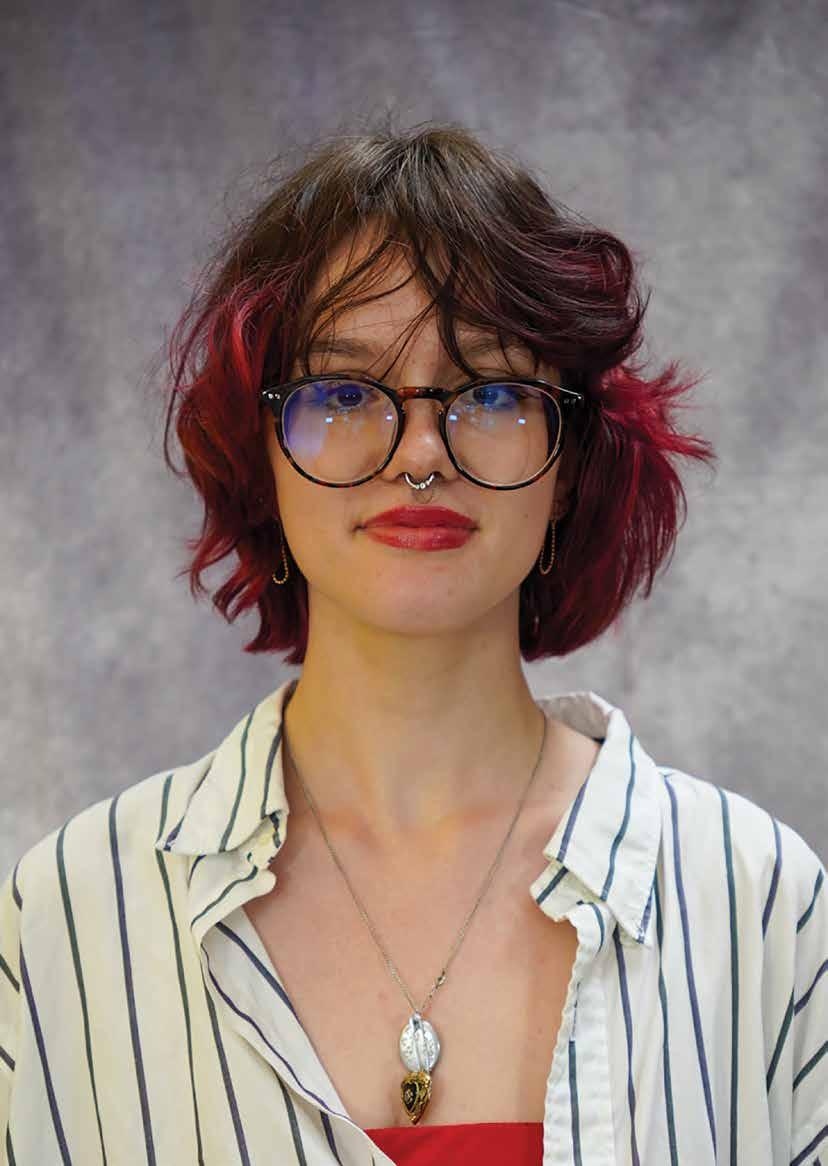
Iwas born into a typical Russian family in a provincial town. My mother was a nurse, and my dad was a handyman. We didn’t have a lot of money; what little we did went to groceries and rent. The community around me was very close-minded: homophobia, sexism, and intolerance were all over. For instance, I was driven to study: binge reading, researching, and preparing for Academic Olympiads. Predictably, I was bullied for it by most of my classmates.
I didn’t want to continue school getting bullied for being myself. So, I found Lyceum-Boarding Schools “Center for Gifted Children” in the nearest big city, Nizhny Novgorod. My parents didn’t have money to pay for it, but I could study there for free if I won the Academic Olympiad in English organized by the Lyceum. I was determined to earn a spot and felt I was on the right path to build a desired future. My hard work paid off, and I was admitted. There, I decided to focus on Academic Olympiads and to get high results in the standardized state exam because they could provide a paid-in-full tuition spot at a university. In addition, I became interested in volunteering during high school: my classmates and I volunteered at the orphanage and nursing home. In September 2020, I discovered I was accepted at Saint Petersburg University for free. At that time, I felt like nothing was impossible: I moved from a gray provincial town to a bigger city, then to the cultural capital of Russia, and I did it on my own. Being goal-oriented, I had another unrealized dream – studying at an American college. I couldn’t afford to study abroad, so I sought scholarships. I found the YEAR Exchange Program for Russians in America. I became a finalist after applying for it, interviewing, and taking the TOEFL In August 2021, I studied for two semesters at Snow College in Utah. I had to withdraw from a Russian university because my education was interrupted, and Snow College and Saint Petersburg University weren’t partners for exchange students.
I finally felt that I was a valuable member of a community. I was setting other goals for my future, but February 24 drastically changed my life. That day, Russia invaded Ukraine and started a horrible war. I quickly began to advocate against it on social media, donating to Ukraine and volunteering in the project to help Ukrainian refugees. I had been signing petitions against corruption and participating in the protests supporting Alexei Navalny, so I couldn’t be silent when the war started. People in my position have been persecuted, tortured, and sent to prison in Russia. On March 4, President Putin signed a new law that made it a crime, punishable by up to 15 years in prison, to “share false information” about the war in Ukraine. This law is being used to silence anyone who dares to speak out against the regime or even report accurate accounts of what is going on.
I was scared for my life; I didn’t want to lose everything that I gained: freedom, safety, and certainty. Moreover, I started getting messages with threats because of my posts. I decided on a big and unexpected step: to apply for political asylum. In May 2022, I finished my exchange program, and since then, I’ve been in the USA as a political asylum seeker.
All of it resulted in a masked depression and a constant feeling of guilt because my country’s army was killing civilians in Ukraine. However, I couldn’t sit by without trying to change the situation.
I made up my mind to create anti-war art to support Ukraine and agitate against Putin’s policies. Since then, I’ve been selling anti-war posters, postcards, and comics to send donations to Ukraine. Russian propaganda convinces many people that the war is justified. One of my school teachers didn’t believe that civilians were dying in Ukraine. After seeing my comics on social networks, she texted me, asking me to share trustworthy sources of information. I was able to support Ukraine and made Russian people who were influenced by propaganda think more critically about the whole situation. Furthermore, three days a week, I volunteer at Help Desk Media, a project to help those who suffered from the aggression of Russia and also to publicize the crimes of the Russian authorities.
After that, I was still feeling lonely. I then discovered the Feminist Antiwar Resistance Group. It was organized in Russia in February 2022, and then Russian female immigrants established such groups in their countries. I decided to start it in the USA: I texted a friend from another state, and we created an Instagram account. After several days, we gained 200 followers, and now we have a chat with Russian anti war feminists all across America. To this day, we’ve been organizing pickets and protests against the war.
I was always driven to change my life and the lives of others for the better; I was never afraid to try something new and risk everything. Looking at my 20 years, I’ve never been a “traditional person or student,” but I’ve always sought a traditional academic education. However, after applying for asylum, I’ve been lost: I don’t have a green card or enough money for tuition, and I am regarded as “a displaced student.” I was scared that I couldn’t return to school; the only way to gain some knowledge was through YouTube lessons. But I wouldn’t be me if I was complacent with the situation. So, I started looking for universities and colleges that support refugees; I applied for ten colleges, one of which was Bard. It was the only college that reached out to me directly and shared an opportunity to get a full scholarship. Since I was already in the USA, my journey was not as challenging as that of other students. I needed to travel to New York from Utah, where I had been staying since applying for asylum (my boyfriend is located in Utah). I was very grateful to be here, mainly for the people at Bard. Everyone I know helps and keeps helping me anytime I reach out to them.
I cannot stress enough how grateful I am! I want to return to my country one day: one day when Putin is not a president anymore and, preferably, in jail, when all political prisoners are released from prisons, when the war is over, and Russia is paying retributions to Ukraine and my home country is freed from tyranny. This is my biggest hope for my country, and for me, it is to see such a country in my lifetime.
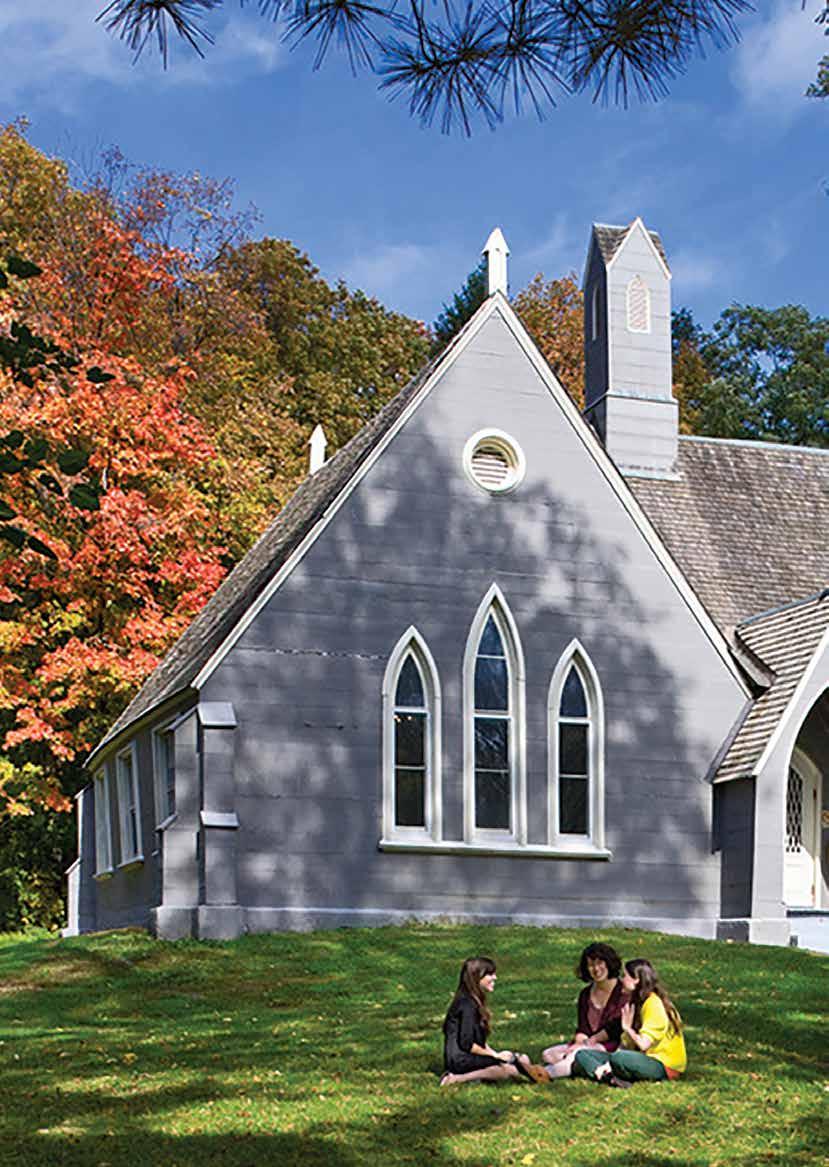

My name is Naseem Nazari, and I am from Ghazni, Afghanistan, and the youngest among my siblings. On February 26, 2020, I made the difficult decision to leave my homeland due to escalating security threats from the Taliban, predating the collapse of the government. The situation worsened in August 2021 when the Taliban seized control, leading to the closure of my university, the American University of Afghanistan. This marked a devastating blow to my aspirations for a degree.
Amidst the uncertainty, I embarked on my journey in pursuit of scholarships, discovering the Bard scholarship specifically designed for Afghan students, particularly those from The American University of Afghanistan. Connecting with Erin Cannan from Bard administration, I received invaluable assistance in navigating the scholarship application process, eventually being selected as a recipient. My belief in hard work and dedication remained unwavering. During my tenure at AUAF, I actively contributed to the Kabul Rotary Club, initiating and leading a campus chapter. Engaging in Model UN conferences, I also undertook projects in Kabul, including tree planting, providing books for children, organizing workshops, and delivering leadership training, with a focus on debate and global issues. Upon joining Bard in spring 2022, my commitment extended to the Bard Center for Civic Engagement (CCE) and the OSUN Civic Engagement Initiative (CEI). Leading the Afghan Hub Club, I collaborated with fellow students to seamlessly integrate our cohort into campus life, showcasing leadership skills. In the summer and fall of 2022, I assumed significant responsibilities as part of the student-led Election@Bard initiative. Overseeing voter engagement and registration, I became interested in understanding the US electoral process and addressed challenges faced by student voters in our region.
Recognition for my dedication and skills came through my involvement with OSUN CEI, excelling in written and verbal communications, data analysis, logistics management, and strategic planning. This resulted in my promotion to the role of Get Engaged Conference Fellow. Currently, I am collaborating with over 90 individuals to coordinate visas, travel, and logistics for the upcoming Get Engaged Conference in June 2024. In acknowledgment of my contributions, I was nominated to sit on the Talloires Network’s Steering Committee and recently received the prestigious Robert Koblitz Human Rights Award from Bard. I am thankful to Bard College for providing a nurturing environment that encourages students to strive for excellence, embrace diversity, and embody the spirit of civic engagement. I extend my heartfelt gratitude to the Bard administration, Erin Cannan, and the entire Bard community for believing in my potential and offering me the chance to pursue my educational and leadership goals through this scholarship.
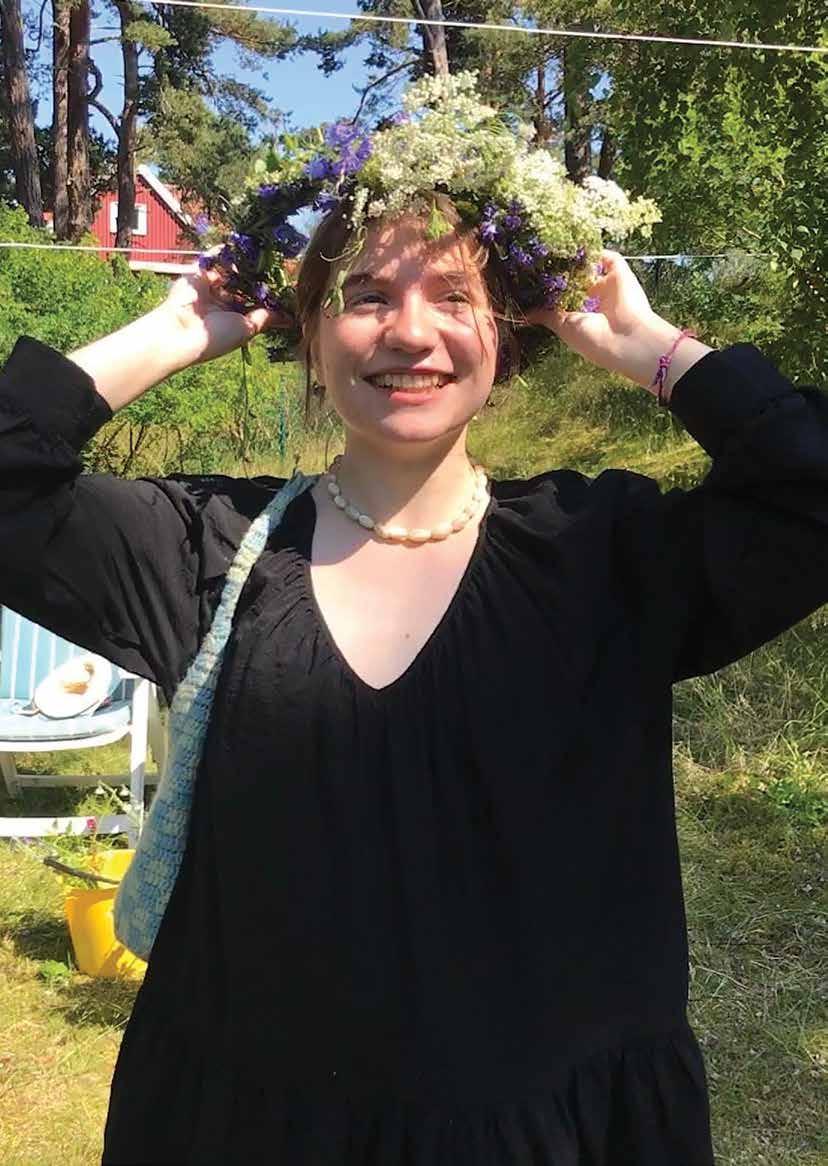
Iam 21 years old and I come from Omsk, a city in Western Siberia, in Russia. I left home when I was 17 years old in 2019 to study in United World College Red Cross Nordic in Norway and I came to Bard in 2021. I now study Studio Arts and Computer Science as a joint major, working in the Center for Civic Engagement and Center for the Experimental Humanities. I was 16 when I received a call from the United World College (UWC) Russian National Committee telling me that there was a place for me in Norway. I was at the top of the wait-list and I had to decide if I wanted to go before the next day. I told them the answer on the same phone call; I didn’t need the extra time. I was alone at home, right after I called my mom and she was scared and happy simultaneously. For me it was a happy day, though I don’t think I fully understood how “forever” it would be. I was mostly happy and excited. I was young and I wanted to study abroad for quite some time as I knew that universities in Russia did not provide many opportunities in the fields I wanted to study at that time. There were worries of course as I did not speak English very well and now I had to study and make friends in it. I never lived alone, never traveled abroad prior to leaving. I was worried for my family and how they would react as some of them did not know I was applying to study somewhere else and the news of me leaving in just one month was shocking for them. I came to Bard after two years of studying in Norway, so I felt like I was prepared. I was really lucky as at that time there was no full-scale war and it was not that hard to get a visa. Due to COVID restrictions, however, I had to stay with friends in Norway for two extra weeks after my graduation for the visa appointment and I could not have been more grateful for their hospitality.
My parents found out I was going the same time I did–a month before I boarded the plane . It caught them by surprise but I think they understood. However, after the full-scale invasion of Ukraine, their opinions have shifted and my grandmothers, for example, are always trying to tell me how bad it is in America and how well Russia is doing. They are influenced by propaganda so I try not to take it personally, but it is tough sometimes. My immediate family is mostly worried about me and misses me and is waiting for me to come visit. I don’t know when it is going to be possible.
I felt guilty as some of my friends did not take it well. My closest friends, however, were supportive and happy for me. Leaving my little sister when she was just about to turn 2 years old was the hardest and it only gets harder as she grows up and begins to understand that I am gone for a long time. While it was hard, I still felt grateful for my family and close friends for supporting me in this difficult process.
I was flying on my birthday and it was my first time coming to the US and being on such a long flight. I was worried as I’ve never been that far from home. I remember I was trying to think of the times when I should call my mom and how it will work with the 11hour time difference and my new schedule. I was honestly so sad. I lived in a very isolated place for two years before Bard and seeing that I will be in the same kind of place for another four was difficult. I was homesick, I said goodbye to so many friends of mine and I did not feel like making new ones. Right now I feel much better, I had a lot of challenges during my time here, but I now have a support system. I try to enjoy this place as much as I can while I am here and really try to look for positive things. It does get better.
There are loads of things Bard has helped me with, especially the Center for Civic Engagement. Helping me figure out taxes, connecting me with the student relief fund when I lost my phone, giving me a ride to the train station and now helping me figure out scholarships for the last three semesters at Bard. I am beyond grateful for all the help I get from them.
I am grateful that Bard has made it possible for me to continue my education and I made some of my best friends here. I hope one day I can pay it forward.
I don’t think my future is in Russia, but I can not wait to visit my family and explore my country, its beautiful cities and wild nature once it is possible for me to go back. I can’t wait to bring all my international friends to Russia and show them how beautiful it can be. How cold the winters are and how warm the summers are.
My biggest hope for Russia is to have fair elections and to be able to voice one’s opinion without being thrown into prison. I hope for equality and equity and I hope for people in Russia to know that life can and will be better one day. For myself I hope to see that change.
I want to say that it does get better, and there are always people that care for you even in the moments when you don’t think so. Do not hesitate to ask for help and advice.


Before the takeover, I had just started having a full-time job, helping to support my family and starting to feel like I am starting my own life finally. I was in a meeting at the office, closely working with rural communities in the Eastern provinces of Afghanistan to facilitate a crucial aspect of negotiations I was having with communities to allow women to participate in the project activities. However, fear began to seep into the office as the provinces were collapsing faster than expected, and news of the fall of Laghman was circulating. Our security team warned us to leave the offices and seek refuge in Nangarhar.
By noon, I had finished the first meetings of the day with the community when I received updates that the Taliban had entered the city and were hiding in houses. In total disbelief, our security team rushed us to cars to take public transportation, spreading out to leave the city. We were forced to abandon everything. In the afternoon, Kunar province collapsed without resistance, and in the evening, Laghman and Nangarhar fell without any resistance from the Afghan National Army. We sought shelter in relatives’ houses as affiliated activists with a prominent NGO. For weeks, I was in shock and couldn’t process what had happened. In fear, as the Talibs were searching for former government and NGO employees, I had to erase all the data on my PC and phone, disposing of my documents. In a matter of hours, the way of life I knew and how I imagined my future were gone. No job, no home – it felt like an unending nightmare.
I had already made peace with leaving the country just a week before its fall by accepting a scholarship to study at Bard College Annandale, but I never thought it would be under such circumstances. Saying goodbyes to family and friends was difficult, leaving everything behind was hard, but my family supported my decision. My dad helped me get to Kabul, as I was too afraid to travel alone. It was a bittersweet moment. I had to embark on a challenging journey, but the feeling of being safe, following my dreams of studying, and just being alive helped me through such moments. It was an emotional journey, full of memories. The night we were leaving, we gathered at a friend’s place, hiding from threats unknown to us, afraid of everyone and everything. When we entered Pakistan, relief washed over us for having escaped the brutality.
I think for now considering the current political climate and without seeing a significant change, it would be difficult to return. But I am an optimist. I hope for a brighter future when youth like me can come back to the country and rebuild it. I ask the international community not to forget Afghanistan. People are suffering, lives are at stake. Millions of Afghans are starving for food, education, and opportunities. Please help the people in these difficult times. Please do not let my beloved country, my people, my young siblings suffer more.
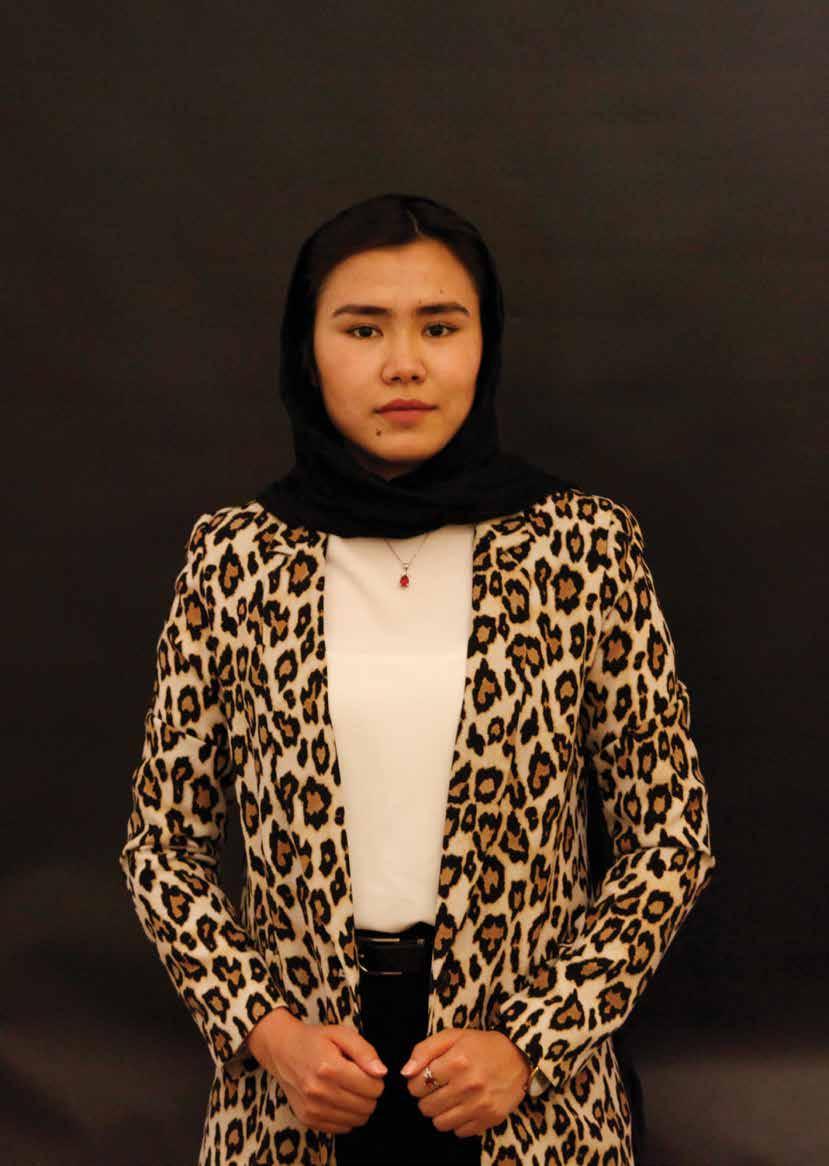
It has been over two years since I was lost. No, not just me but all of us are lost; all of us who left our dreams, homeland, families, friends, and loved ones. The Taliban has not just taken control of Afghanistan but has taken away all our childhood dreams and achievements that we have worked so hard for several years.
On August 15th, I woke up with an email from the president of American University of Afghanistan, where I studied. In that email, he said we would support the students and have their backs in any situation. At that moment, I realized something terrible was going to happen. Hours later, President Ashraf Ghani left the country, and the Taliban took control of Kabul. It was very painful to have to burn up all of the achievements I had spent many sleepless nights on working hard to achieve
I started destroying all my documents from my university, including the certificates I had earned from different organizations and programs I had worked so hard for in the past couple of years. Finally, after three days full of trauma, on August 18th, I, along with six other students, was evacuated from Afghanistan to Doha, Qatar, by the American University of Afghanistan. I was in Qatar for more than two months. After getting processed, I came to the United States in November and landed in New Jersey.
I was in Qatar when I heard Bard College offers scholarships for Afghan students to continue their education. I applied for the scholarship, and one week before my flight to the US, I got an email from Bard College mentioning that I got accepted as one of the scholars. That was the best news for me during those difficult days and nights. I come from a family in which education is of high value. Meanwhile, I come from a society where traveling alone is not typical for a young woman. Now that I am at Bard College, I have the opportunity to change my life and future. I promise to try my best not just for myself but for all those Afghan girls and women who have been at the forefront of injustice and fighting for their rights for several decades in Afghanistan. As Jeffery Fry said, “Sometimes life seems like a dark tunnel with no light at the end, but if you just keep moving forward, you will end up in a better place.” I believe there is a light at the end of this darkness and reaching for that light is my biggest mission.
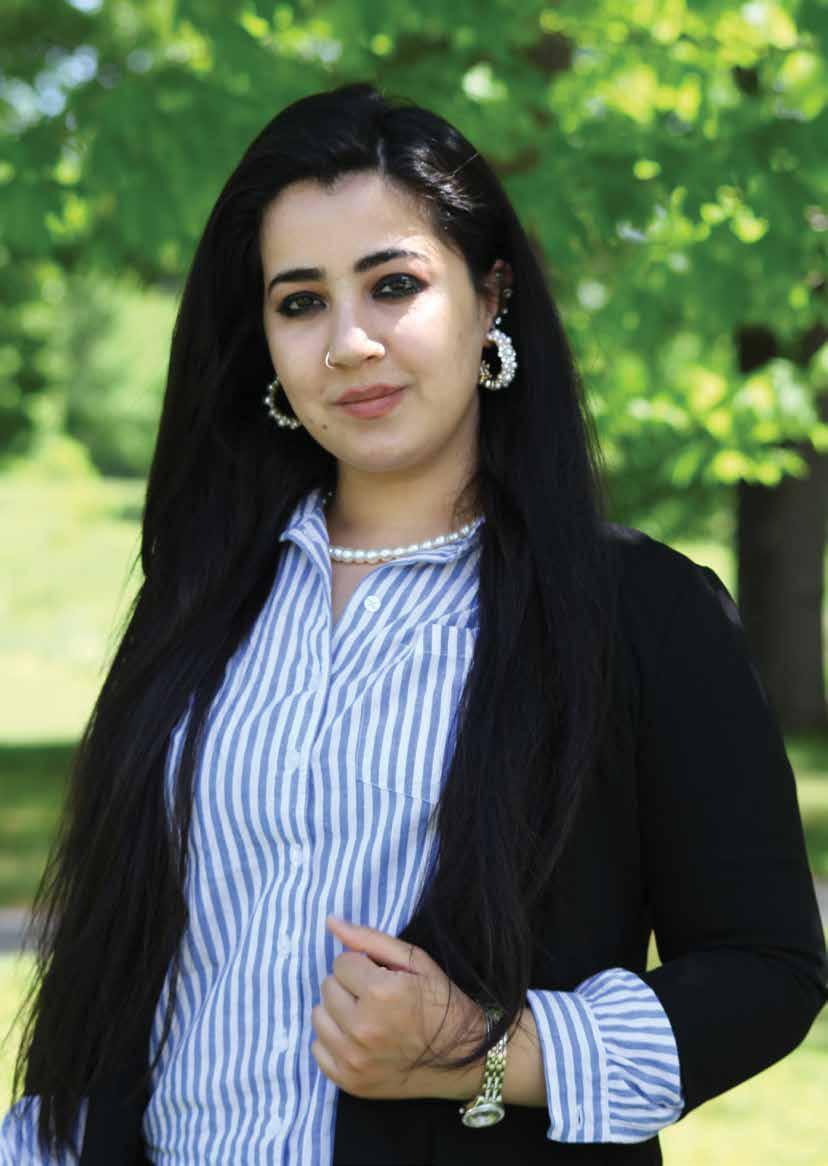
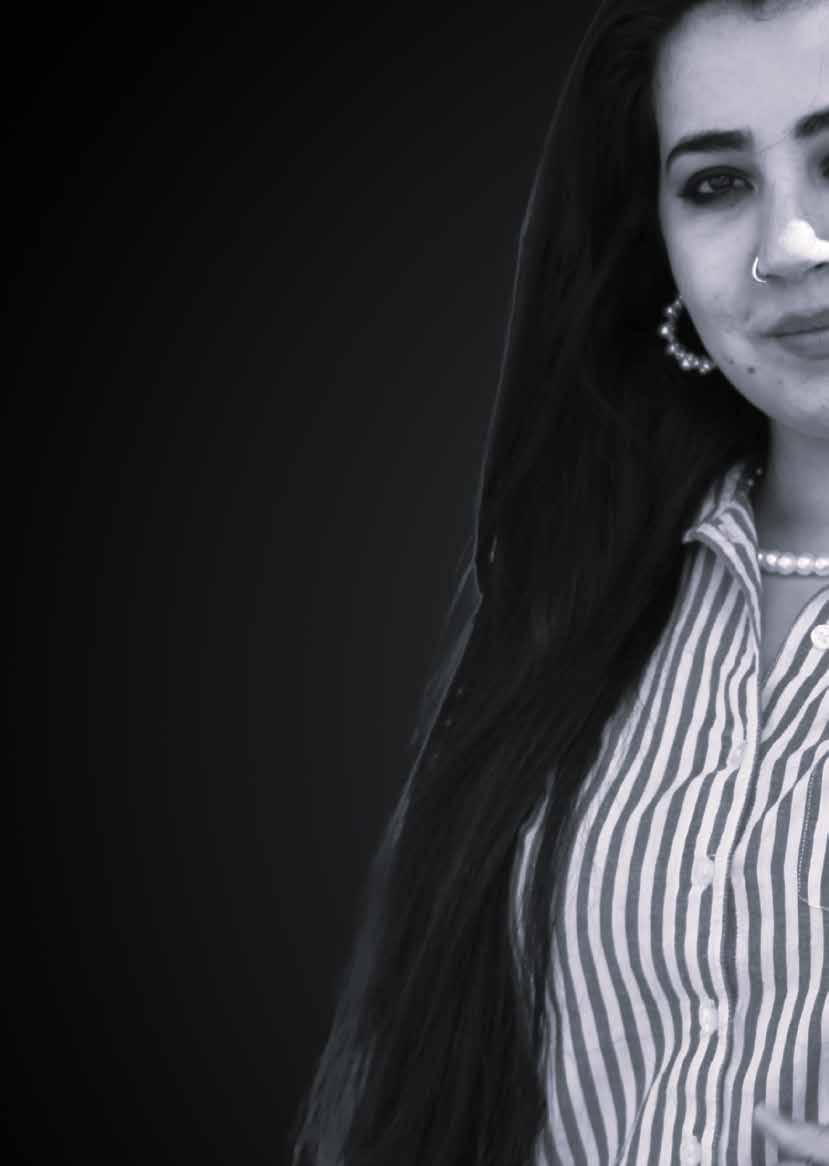
It was August 14th, 2021, when I heard that my hometown Mazar had fallen to the Taliban. Then I was in Kabul, and on August 15th, my cousin came home and said that the Taliban had arrived in Kabul. It was the worst feelingI was working in the US Embassy in Kabul with the former government. For the whole 11 days, my colleagues and I didn’t sleep an hour properly. Finally, it was August 26th when we evacuated. We went to Bahrain for a day, and from there, I came to the US within 24 hours. The first day I entered the US, I took a deep breath and resolved to start over again and told myself everything would be fine. I know everyone wants to visit the USA, but this was different. It took me months to recover from the trauma I had been through.
I heard about the Bard College Scholarship on social media, and I got accepted. On my first day at Bard, I woke up on a cold morning to the sound of the alarm. I saw the frozen snow out of the window, realizing that I was far away from the place where I had spent all my life, where my childhood, memories, friends, work, and my university all were. As a migrant, what comes to my mind daily is that I was lucky to get the opportunity to fulfill my dream by getting a scholarship to finish my BA. But will everyone be able to get that? Will all girls be able to settle in a new country? What about the freedom and rights of those in Afghanistan? Will they be able to go to school? To go to a university? Freedom and immigration both make us happy and sad at the same time. We encounter many obstacles when moving to a new country, like transition, family, work, culture, religion, etc. The change to an unfamiliar country is the toughest one to encounter. We should remember that when we use the word “migration,” it means there is a reason why one left their country and moved to an entirely new place and started everything all over again. It is the wish of everyone to live a happy and free life in a country where they get equal opportunity and thereby secure a better future for themselves and their families.
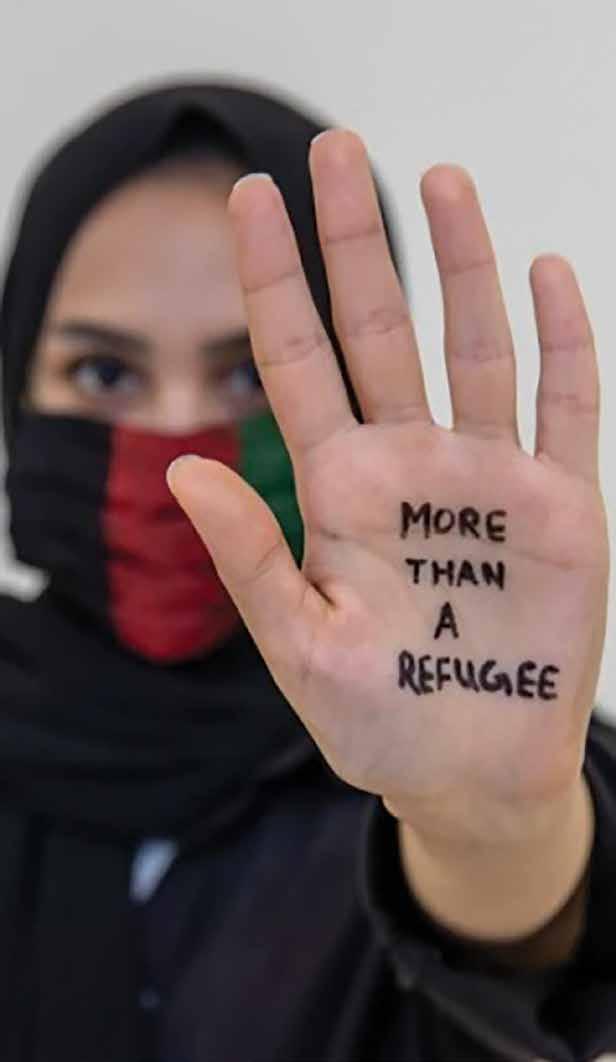
Iam a junior at Bard College and a former American University of Afghanistan student. My parents were educated and raised in the diverse society of Tajikistan during the Soviet era. My mother was almost the same age as me when she and my father had to immigrate to Afghanistan during the Tajikistan Civil War. They lost their country and home, abandoned their family, and hoped to live in a new government. Both my parents tried their best to work full time and almost do everything they could for my sister and me to have a good life. As my parents started working with NGOs, I grew up in an American environment and learned English from American kids while playing together. After moving to Kabul, my sister enrolled at the American University of Afghanistan, but later she was one of the victims of the Taliban attack in 2016. Fortunately, she decided to graduate despite the brutal incident. Years passed on, and we passed the obstacles slowly until 2020 brought many changes to our lives.
I had to study online, but a year later, when things were moving smoothly, I had to say the hardest goodbye and become a refugee again. On the first day the government collapsed, I could not believe my ears and eyes. It all happened so unexpectedly. My mom lost her job, and so did my sister. I said to myself, how can I graduate now? The American University of Afghanistan offered me a chance to get out of the country, and I took this chance. I did not know what would be my final destination. To this day, it haunts me that I could not say goodbye to my mother correctly, thinking there was no chance for me to get out of the country and that I would soon be back home. I was evacuated to Qatar and stayed there for about two and a half months. I was lucky that God kept me safe and created a comfort zone with six other girls from my college. Finally, we were taken to the U.S. military camp in Doha, Qatar. After three weeks, we were able to get a flight to Philadelphia and on to New Jersey.
I have seen the bright blue sky after a dark tunnel in my life. Yet, it was a massive challenge for me to be independent and take care of myself while still thinking about my family, who are still trapped in that dark tunnel. I applied for a scholarship at Bard College and got accepted. Here I am, continuing my education to become a person that someday will be able to help those who suffered and experienced the same situations as me, to become the voice of those whose rights were violated. At Bard, I am the assistant treasurer of the International Student Organization (ISO) and a co-head of the CASO. As someone who values cultural diversity, such clubs are an essential way to promote cultural exchange and understanding among students. Ultimately, my motivation for creating a culturally diverse club in Bard is to help promote a more connected, diverse, and inclusive campus environment where everyone feels valued and supported, regardless of background or nationality.”

It’s still all very vague to me. On the day of the collapse, I was home alone when my father called, informing me that Pole-Charkhi prison had released all prisoners and advising me to stay at home. Suddenly, all networks stopped working. My only concern at that moment was my family, who were outside. I began to contemplate that this might be it – I could be stuck with the Taliban, living under their rule and law forever. The idea of leaving Afghanistan again never crossed my mind. Leaving my family in that condition was one of the most challenging decisions I ever made. It was a choice driven by the desire to continue my studies. I often reflect on whether I was too focused on myself, even though my family was incredibly supportive of my evacuation. The night I said goodbye to my family still lingers in my memory, wondering when I would see them again.
Choosing the United States was not my decision but my family’s, driven by the hope for my safety and a peaceful life. The journey to Islamabad was emotionally challenging. I wasn’t in a good condition, and throughout the trip, my thoughts were consumed by my mother. Upon arriving in Bard, I realized everything had changed. I understood that I would never go back to Afghanistan in the summers the way I used to. Despite this, I am profoundly grateful to those who facilitated our evacuation; they saved many lives and many talents. Unsure about returning to Afghanistan due to the trauma and bad memories, I consciously avoid thinking about it as it only brings pain and aches my heart. I can never forget condensing 25 years of my life into one backpack. If one of my wishes were to come true, it would be for my country to find peace and my people to be spared poverty and hunger.
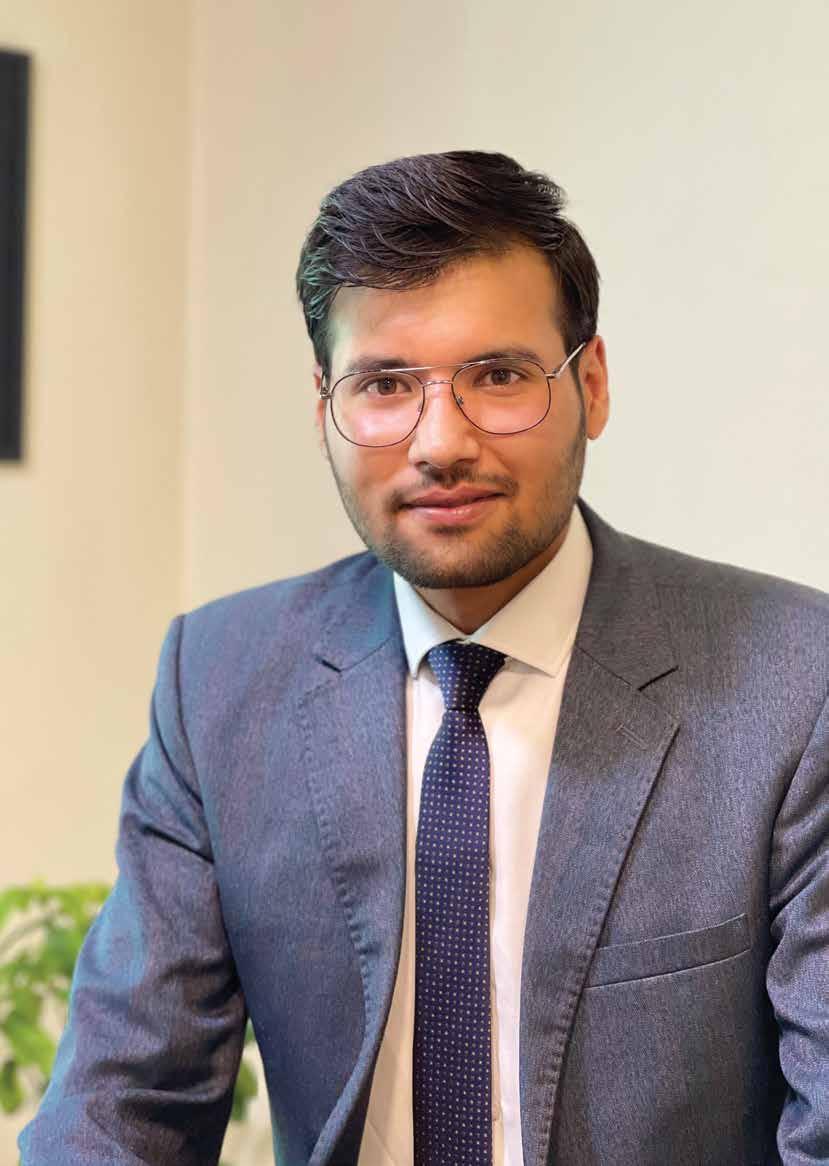
Iwas en route to the Turkish embassy to obtain visas for my family when the Taliban invaded Kabul on August 15, 2021. There was chaos running through the city. People were closing their stores, running to their houses, and going to the bank and ATMs to get cash. The city was congested, and I was having trouble getting home. When I arrived home, I heard the news that Kabul had collapsed. I stayed at home, and I was trying to find a way to get out of Afghanistan. Because my father was the head of the attorney general of national security and my mother was a Supreme Court Judge, the Taliban had our exact home address, and they could find us easily. My parents have imprisoned and ordered the execution of several members and leaders of the Taliban over the past 30 years.
That day, I took my parents to a secure place in a basement for a couple of days. Then I changed my outfit to look like an ordinary person from a rural province. This outfit helped me to go outside and grab food and groceries for my family. It was August 19 when the Taliban came to our house and asked for my parents, and they did not find them. They wanted to arrest me and took me with them. Fortunately, the elders of our neighborhood came to help, and they sought the Taliban for a formal document granting them the authority to arrest me. Finally, the Taliban allowed me to go unarrested.
On my last day in Kabul, I went to all the places where I spent my childhood and adulthood, and I visited my university, AUAF, and Kabul University, for the last time. I wanted to have a goodbye moment with my beloved country. On August 23, I was evacuated from Afghanistan by the U.S Marines. When I arrived at Kabul Airport, I was unsure how to feel—happy that I had been given a second chance at life or sad because I was leaving my motherland and all the values we have been fighting for in the past 20 years.
Everything was unknown, even where I was going. After spending a night at Kabul airport, I went to Qatar Air Force Base for two nights. Then I went to Ramstein Military Base in Germany, and after a week, I came to the United States on August 31. I stayed in Quantico Marine Base for forty-five days. I emailed the Bard Admission office while I was still at the military camp and Bard College encouraged me to apply for the scholarship. After ten days of applying, I got accepted to Bard College. For me, it was unbelievable since Bard had helped me find my way when I had no idea where to even begin when arriving in the US. In November, I was one of the first cohort members who came to Bard College. Now, I am double majoring in political science and computer science. I am taking a break after running a long way, and I am thankful to Bard College for providing me with the opportunity to continue my education.


Last August, I was in Kabul, Afghanistan, stuck in the chaos of a state occupied by the Taliban. Now I am in New York State at Bard college, resuming my politics degree. It might sound easy, but in reality, the experiences, trauma, and struggles of the past year have changed me as a person significantly, and I will never forget or probably recover for all my life. Last year, in Afghanistan, was my senior year. I had landed my dream job. I was the executive assistant in the Ghazanfar group of companies, the largest corporation in Afghanistan. I worked with the CEO and the project coordinator board on projects that would change Afghan people’s lives. I wrote market research papers and presented the data for community-building projects funded by the Afghan government and DEG to the world bank and Asian Development Bank. ADB and WB, our closest partners at the time through the Mazar IPP project, were worth almost $100 million USD, one of many projects I was passionate about. I wrote business proposals for managing the city waste in Kabul and building landfills to produce power, recycle, and build infrastructure through industrial parks in Afghanistan. Imagine all this vanishing overnight, and you are on a military plane to an unknown destination. I did lose everything overnight, but I never took a break. Upon my arrival in the States, I worked to get more of my friends left behind out of Afghanistan, continued my degree, and started work to help back home. Although I have my family in Afghanistan, which is in my head every day, I try to keep myself occupied with work. I work remotely with a firm to help Afghan families in the United States blend in culturally, economically, and socially. I am also working on my senior project for my politics degree and my scholarship applications for graduate schools.

When I was a kid, my parents told me scary stories about the Taliban. Seeing what they did shocked me. The Taliban made it so we couldn’t go to school anymore, and businesses closed. Everything felt like it just stopped, and I didn’t know what to do. Moving to a new place is scary, especially when you have to leave your home and you didn’t choose to. The journey wasn’t fun because we were all sad about our families and our country. I was really scared to move to New York. But the team that helped us move and the people at AUCA and Bard College Annandale were really nice and made it easier for us. I want to thank them a lot for helping us during this tough time.
I hope to go back to Afghanistan and help make it better. It’s not just a wish; it’s something I really want to do. When I heard about leaving, I promised myself that I’ll come back to my country to help. I want to work with other students to bring peace and unity to our beautiful country. The journey might be hard, but all of us students wanting to make things better can help a lot.
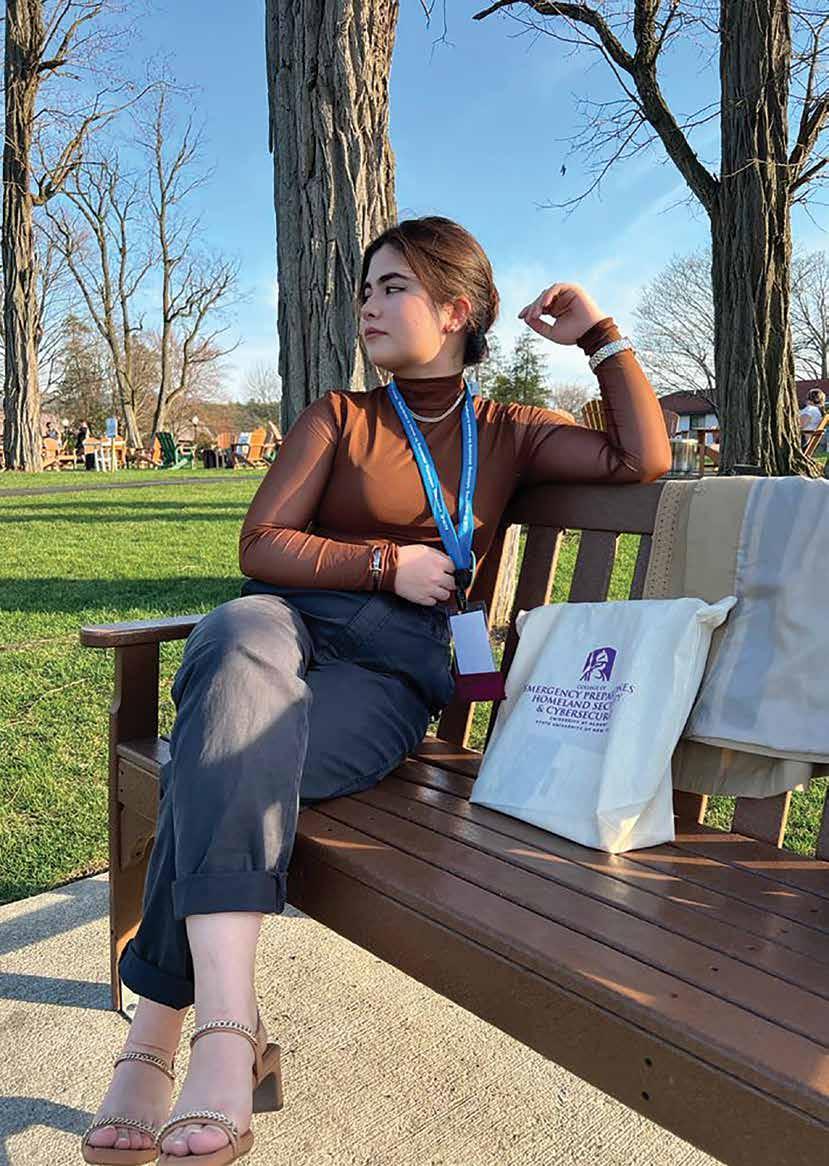
Iam a former American University of Afghanistan (AUAF) student. Since the curriculum of AUAF and Bard are somehow the same, I did not face many differences in my academic life after leaving Afghanistan. However, environmental changes and culture shock are part of the transition from Afghanistan to the United States. Bard is home to many international students who come from diverse cultures, beliefs, and religions. In other words, there is not a vast difference in my academic life, but I can see a massive difference in my social life.
I believe that students during their college years in the US have more opportunities to enjoy life and follow their hobbies. However, my hobbies stayed the same as what was in my country. During my first year at Bard, I got the chance to learn and work on team building exercises, communication, and leadership skills. I got these skills through workshops, class activities, and extracurricular activities that I attended at Bard. My best achievements during a year at Bard are getting good grades, finding new friends with diverse backgrounds, and exploring new places and people.
In August 2021, AUAF students received an email that indicated that the university would be open for the Fall semester. It was one of the best news on that day because all we heard was the fall of provinces in Afghanistan. Little did we not know that AUAF students would not see that beautiful campus again. On August 15, the capital city of Afghanistan, Kabul, was occupied by the Taliban.
The Taliban has ruined all our goals and dreams. It was during summer 2021, I had a class, and everything was extremely overwhelming. Thankfully those days were the last days of Summer 2021, and the class ended. But the feeling of losing my homeland did not. Like that, the fall semester began. I had five classes that semester, and it was extremely tough to maintain them in that situation. The evacuation process was such a strange experience—besides, the place where I was after the evacuation had no internet. I had one of the most challenging semesters. Because I was facing ten hours of time conflict and had internet connectivity issues, now that I am here aboard, I am happy and thankful that I can finish my degree in a peaceful environment. EDUCATION WILL PREVAIL. One day we will be back in our beautiful homeland.
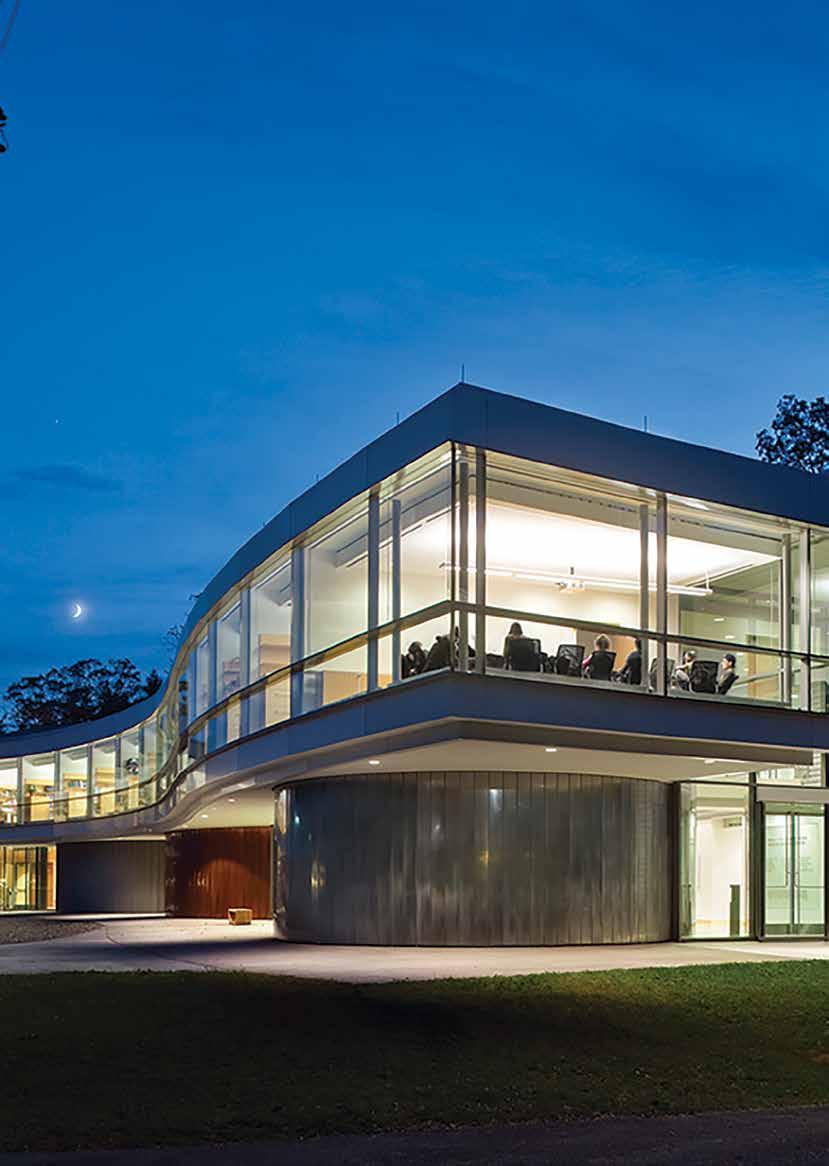
Adark day unfolded when Kabul fell to the Taliban. The sense of losing everything I had diligently worked for and the uncertainty of continuing my education weighed heavily on me. In the final days of the American troops’ withdrawal from Afghanistan, whispers of evacuation reached my ears, and my sole focus shifted to my education.
Departing at midnight, I couldn’t bid farewell to friends or extended family, reserving my goodbyes for my parents and siblings, possibly for the last time. Departing in haste, I left them amidst tears and sorrow. The journey from Kabul to Torkham unfolded with an underlying fear due to the pervasive presence of the Taliban across borders and streets. Those accompanying me shared a collective sense of uncertainty, torn between the hope of returning and the fear of not crossing the border. The perilous journey lasted over 24 hours, with more than 12 hours spent on the treacherous border until we reached Islamabad. Sleepless and without sustenance, the journey took its toll.
Despite the challenges, a feeling of optimism and happiness accompanied me on the journey. Arriving in New York, excitement engulfed me as I explored the city and its people. Being in New York is a privilege, affording me the opportunity to pursue my dreams. The experience, bitter yet transformative, marked the toughest decision of my life. I remain steadfast in pursuing my goals, regardless of the cost.
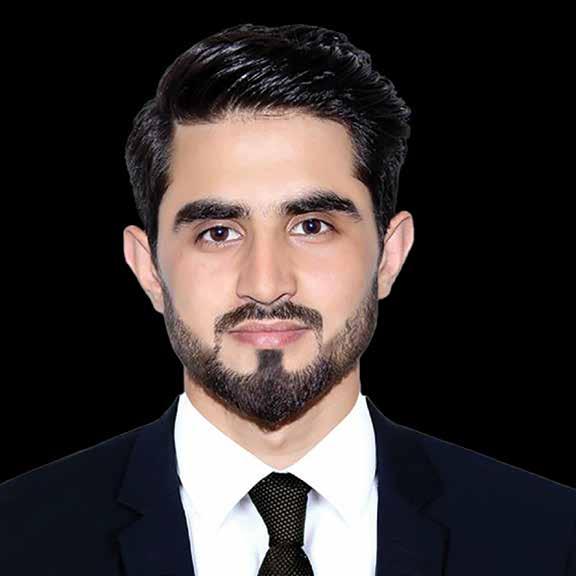
As a medical student, social activist, and head of the National Islamic Movement of Afghanistan in Balkh Province, I fought against the Taliban and extremism. I also worked closely with the US forces to promote peace and stability in our country.
The war intensified during my vacation in Kabul, and the city became a battleground. Then, one afternoon, my phone rang as I returned to the university. My brother was on the line, warning me not to leave the house as the Taliban had seized Kabul. The news hit me like a ton of bricks, and my heart sank. I had never faced the Taliban before, but I had heard many terrible stories about the terror they had inflicted on innocent people.
As panic swept through the city, I searched frantically for a safe place to hide. The sound of gunfire and explosions echoed in my ears, drowning out the screams of the wounded and dying. I felt helpless and alone. Then, finally, after a few hours, I saw a large crowd of people running toward the airport. Desperate to leave the city, I joined them. But when we arrived at the airport, the Taliban had already closed all the gates, leaving us stranded.
Thousands of people, including my family and I, tried to enter the airport several times, but we were turned away each time. Then, on one occasion, I was only a few meters away from the entrance when a bomb exploded, killing and injuring hundreds of innocent people. The explosion sent shockwaves through my body, and the fear it caused me was indescribable.
My father and brother, who had worked with the American forces, were in grave danger. The Taliban started searching every house, including ours, and we feared for our lives. Nevertheless, we hid and took pictures of our documents, which we sent to my brother in the United States.
I fled to Mazar-e-Sharif to seek refuge with our National Islamic Movement of Afghanistan, but the Taliban recognized me, and I had to returnto Kabul. My father advised me to leave for Pakistan as I was the only one with a passport who could obtain a Pakistani visa. So I went to Pakistan alone and terrified. In Pakistan, I contacted people I knew from the US forces and our movement, hoping for help, but none responded. I felt like the world had turned its back on me. I was alone, broke, and brokenhearted.
Finally, I received a positive response from Bard College, which offered me a scholarship. I was grateful for the opportunity, but it did little to ease the pain and heartbreak of leaving behind everything and everyone I had ever known and loved.
The tragedy of the situation weighed heavily on me, and I felt like I had lost a part of myself. The memories of those dark days in Kabul will haunt me for the rest of my life.
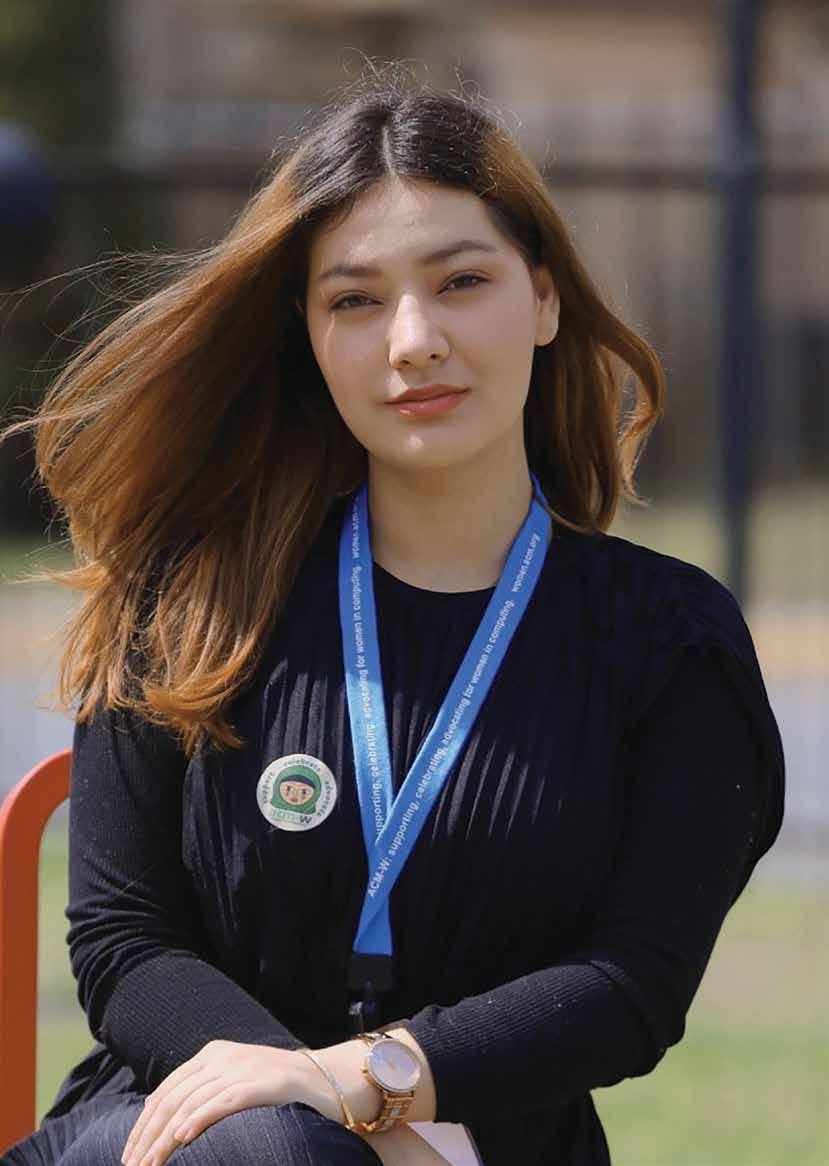
In August 2021, the world I knew was turned upside down. The collapse of my homeland, Afghanistan, forced me to leave everything familiar behind. Just a few months later, in November, a new chapter of my life began with a scholarship to Bard College. The transition was anything but easy. The haunting memories of the collapse made it difficult for me to blend into the Bard community. However, I was determined to carve out a new path for myself.
The turning point came when I applied to the Bard Globalization and International Affairs Program in New York City in the summer of 2022. This experience was a revelation. It broadened my horizons, introduced me to a wealth of knowledge, and led me to my first internship in the US. Returning to Bard in the fall semester of 2022, I felt a newfound confidence. Inspired by what I had learned, I started “Kids Who Code” in Kingston for the Center for Creative Education (CCE) with the support of Paul Marienthal and the Trustee Leader Scholars Office at Bard. Every Wednesday afternoon, I would travel to Kingston, filled with excitement to teach kids coding—a skill I wished I had learned earlier in life but never had the opportunity due to circumstances back home. My engagement didn’t stop there. In Spring 2023, I volunteered for the Ulster Immigrant Defense Network, helping them update their website, and meanwhile, I started ESL certification and tutored ESL students. My creative skills also found a platform as I designed logos for various Bard offices and programs. Additionally, working for two semesters at Foreign Languages, Cultures, and Literatures at Bard (FLCL) further broadened my horizons, eventually leading me to secure a position at a Fortune 500 company.
Reflecting on my journey from Kabul to Annandale-on-Hudson, I recognize the hardships but also the incredible growth and opportunities that have come my way. My journey has been marked by achievements and, yes, fun—a stark contrast to the initial turmoil. On quiet Sundays, as I savor a coffee by my window, I think of the countless girls back home deprived of education, and I feel a deep sense of gratitude for the path I’ve been able to take.
Though I miss Kabul, Bard has become my second home—a place of beauty, challenge, and transformation. As my senior year progresses, the bittersweet realization that my time at Bard is nearing its end grows stronger. Yet, Bard will forever remain a part of me, a testament to resilience, growth, and the endless possibilities that lie ahead. From Kabul to Annandale, and now, as I look forward to the future, I carry with me not just memories but a foundation of knowledge, experience, and the unyielding belief in the power of education and community. This journey, though not without its challenges, has shaped me into who I am today, ready to embrace whatever comes next with open arms and a heart full of dreams.
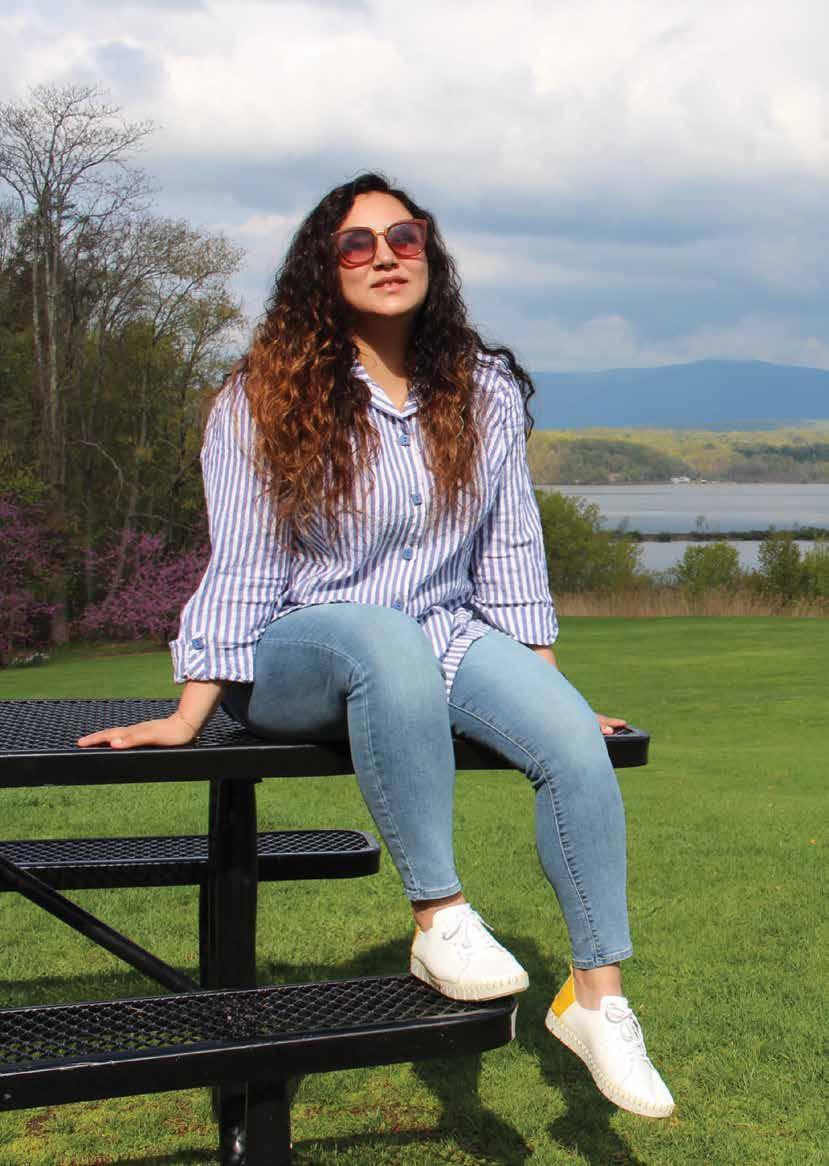
am interested in gender equality, women’s empowerment, and business development. I have experience with marketing and microfinance institutions. The project that I am working on at Bard is called Phoenix Handmade Collections. It is a student-run club that combines art and business, as a collaboration between Bard students and Afghan transfers who volunteer to make creations that support Afghan women and children. Phoenix Handmade Collections was created by two young Afghan women who love their country. Phoenix recognizes that we all have many life stories to tell the world and it reflects Bard volunteers who are interested in art and business. Our mission is a symbol of peace, hope, and wisdom. The name comes from an immortal bird associated with Greek mythology that dies and turns into ashes but it is born again. This is echoed in all of our life stories; united, we stand strong, but divided, we fall. We are born stronger again for a better life.
Our vision is that by making creations such as earrings, we can garner donations to help Afghan women and children with basic health and education expenses. At Phoenix Handmade Collections, we believe access to healthcare and education is a fundamental human right. We intend for our project to ease the cost of that access, and to make it accessible to all. We are not only raising funds, but we are also providing Bard students with the skills to become future leaders in art and business. We will be facilitating team building exercises, mentoring in marketing (including product promotion, digital media communications, creativity, and assembling products), and networking. Once women feel empowered through business and art, they can work towards making a better life for the community-at-large.
For us, Phoenix is not only a project; it is a way to achieve peace through art, like a therapeutic salve for our pain. Our volunteers have their own life stories filled with pain; so when they make earrings, we can achieve peace of mind. We hope the new generation does not face the same challenges in their life. This project is women-run and is focused on bringing hope to Afghan women and children and helping them to afford education and basic healthcare. In addition, this project will empower Bard students with new valuable skills in art and business.
Our future goal is to continue expanding our method of uplifting a community of women in mutual and reciprocal ways so that they can be independent. Also, we intend to expand a network to engage and empower all genders through our therapeutic work.
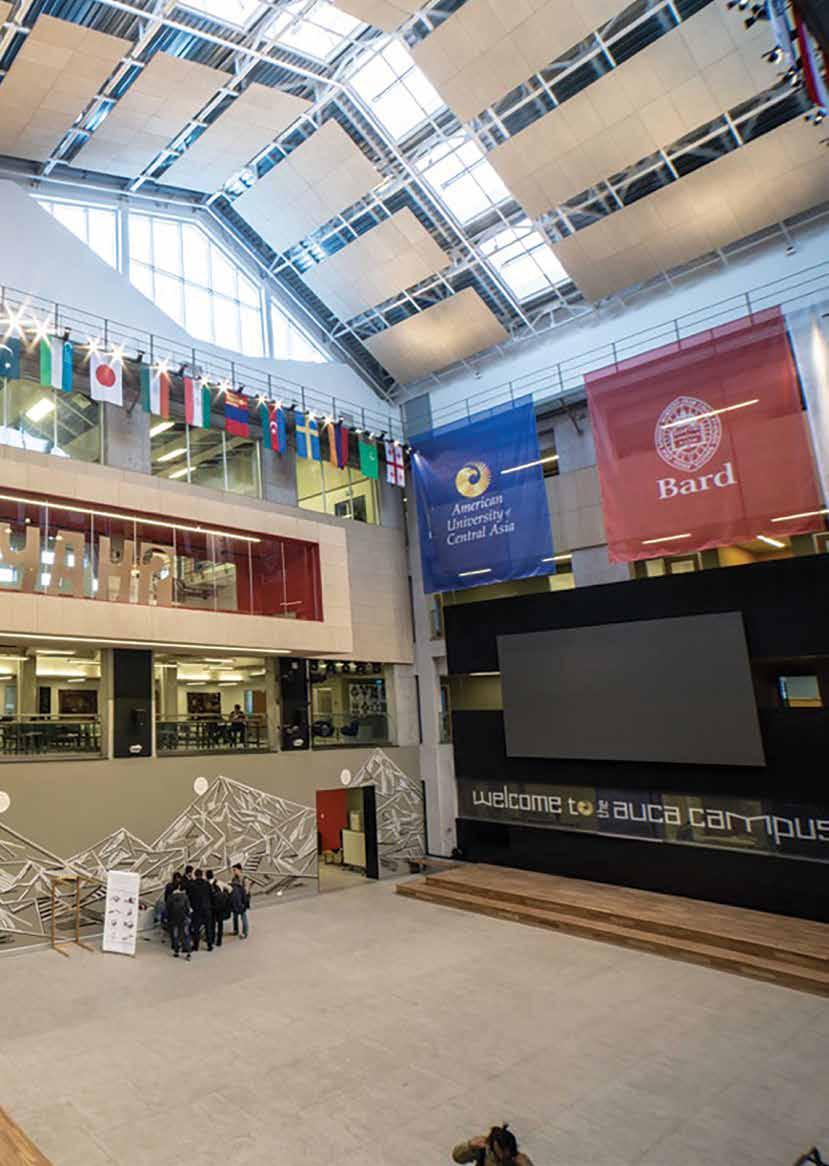
As a 25-year-old girl who once called the war-torn landscapes of Afghanistan home, my life’s narrative took an unexpected turn when Bard College extended its compassionate hand to relocate students like me to the United States. The period of time from June until September was horrifying. My family and I would almost never leave home after the full takeover of the country. We were too scared. Before they took over, we all had jobs and we were living a good life. But, After the takeover we were told to just stay at home. Schools closed, universities closed and almost everyone was imprisoned in their homes. It was like a horror city.
The journey that unfolded was nothing short of a scary roller coaster, marked by fear and a myriad of emotions that ranged from uncertainty to newfound hope. Evacuation became a lifeline, and Bard College and AUCA emerged as the beacon of hope guiding us to safety. Boarding that flight to New York was simultaneously terrifying and liberating – leaving behind the familiar, stepping into the unknown. Arriving in New York after studying at AUCA for some time, the bustling cityscape seemed both overwhelming and full of promise. I carried with me not just a suitcase filled with essentials but a heart laden with dreams and the weight of the past. The question of what my future held loomed large, casting a veil of uncertainty over my newfound reality.
Bard College, however, quickly became my safe place.. The campus, with its serene surroundings, embraced me with a lot of support. The faculty and staff went above and beyond to ease our transition, creating an environment that fostered not only academic growth but also personal healing. In those moments, I realized that I wasn’t just a displaced soul; I was a student with the power to shape my destiny. Enrolling as a senior student in the Computer Science Department at Bard opened doors to a world I had only dreamt of. My journey at Bard, however, wasn’t confined to the classrooms alone. I found myself immersed in various civic projects. Bard College’s commitment to social responsibility resonated deeply with me, igniting a passion to make a positive impact on the world around me. These initiatives became not just extracurricular activities but avenues through which I could contribute meaningfully to my newfound community.
As I stand on the precipice of graduation, I reflect on the incredible transformation that Bard College has facilitated. The scars of my past have not disappeared, but they have become a testament to resilience. And now, as I step into the world beyond, I am armed with the knowledge that every challenge is an opportunity, and every dream is within reach. I am still worried about the future as to where I will be, will I find a job? Will I be homeless and won’t find a job, but then I think about the network of people that I have within OSUN and Bard and my worries go away. I know that I can reach out to them for support and they will be able to help me.


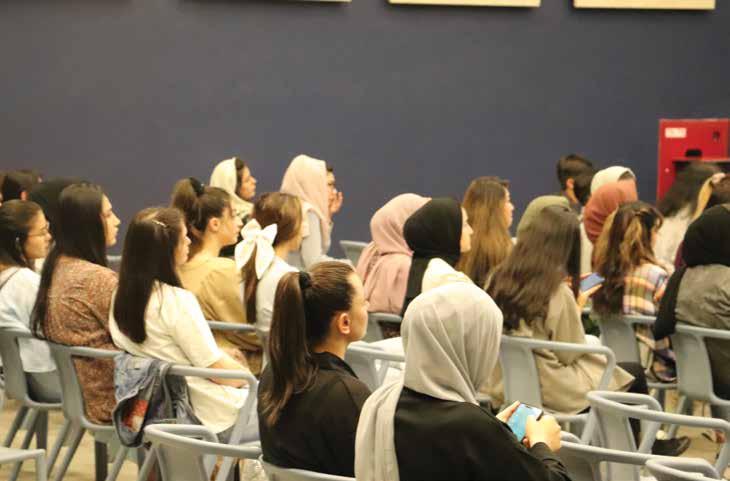
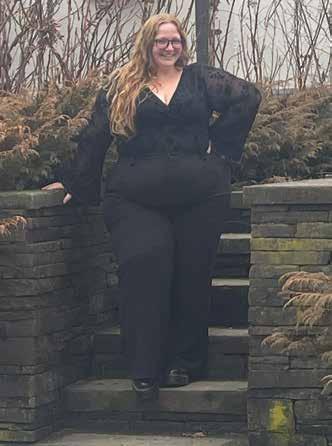
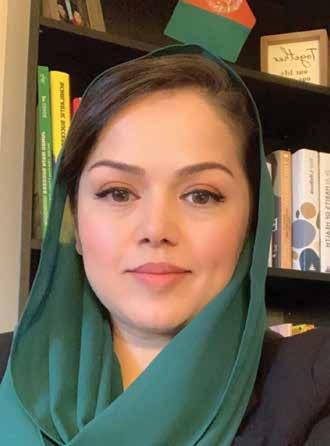

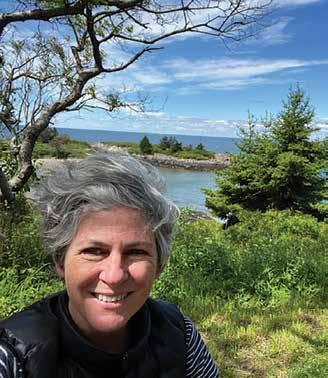
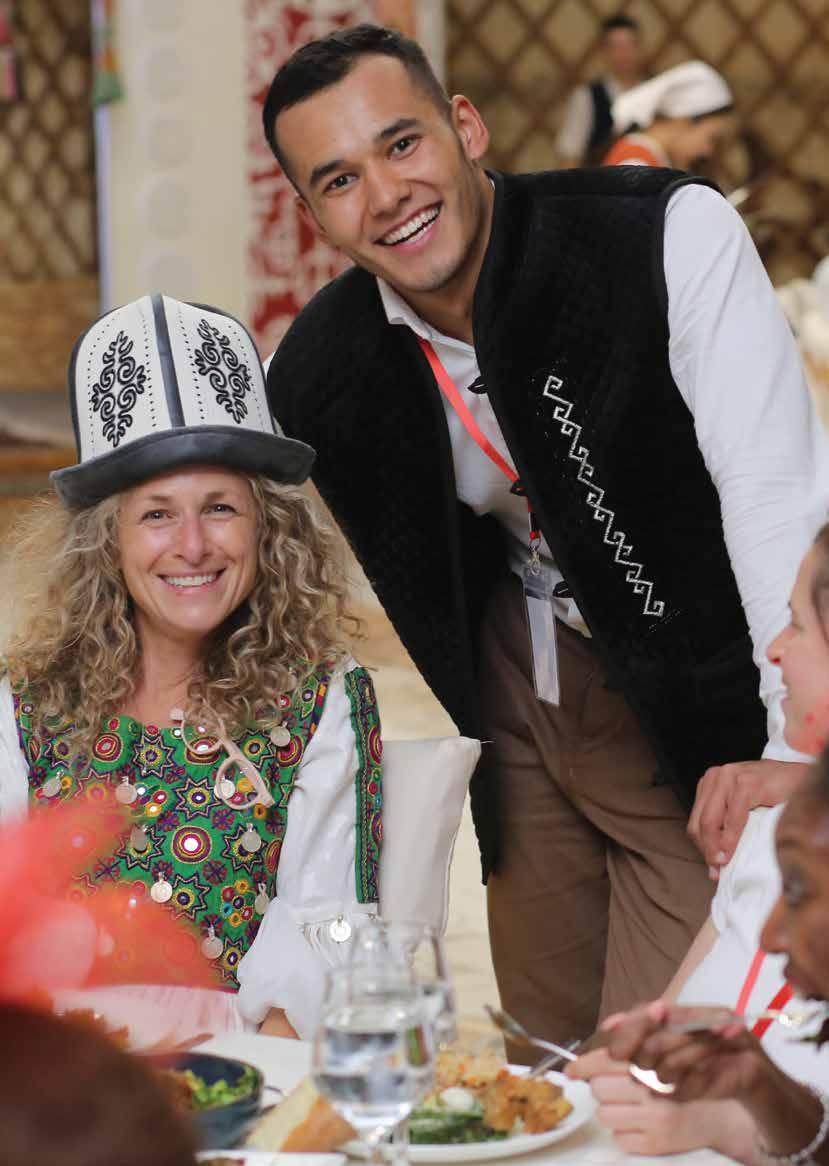
Since 2020, I have led OSUN’s international Civic Engagement Initiative, which includes student leadership training, research, curriculum, and institutional capacity building. I also coordinate the Bard Center for Civic Engagement’s local initiatives, teach courses on civic engagement, and supervise career services. My work with students began when we launched the CCE in 2011-2012. At that time, our focus was on student leadership development with an emphasis on skill building, the encouragement of creativity and self agency and building the international community. In the summer of 2021, I was co-teaching an online civic engagement and social action course with students from over 15 countries, including Afghanistan. That July, students were reporting what they were witnessing and some began to leave home while still completing the course. Many of those students were evacuated with the large cohort that left Afghanistan that summer and are now students in our network, many of whom have graduated or will be graduating from Bard. Working with students at Bard is humbling. Everyday, a humbling experience. My world has changed forever. Nothing can replace personal connections. Those connections are informing my own sense of leadership – what it takes to truly be engaged and what I need to do to adjust or change to be a good support for students.
The biggest challenge was trying to make real the impulse to help and open our doors to the reality of the experience. We didn’t know what we didn’t know, so our learning curve was steep. Only in partnering with students could we figure out how best to create systems; there wasn’t time for planning and we were still in the pandemic. I was really struck by the immediate response of all of my colleagues, who jumped in to make it happen. Across the whole campus and in the community, no one hesitated. I’m not sure that’s the norm in most places.
Community is a precious and vulnerable thing. We can’t replace the lost communities that students have had to leave but we can do everything we can to make our community inclusive; this is the practice of the principles of civic engagement and global citizenship.
That summer into fall, I scheduled regular check-ins with students from our class. It was hard to know what to say or do and it was hard to not feel helpless. We just kept setting up calls even if we didn’t have a lot to say. I guess that’s what I learned out of all of it. Showing up again and again can make a difference. And, since that’s what I could do at the moment, that’s what I did.
When I heard from one of the students that they made it to Pakistan, I cried. I felt relief and sadness– that life forever changed. I thought about his mom. I’m
a mom. The sacrifice of the family pushing for the evacuation knowing what it would mean was agony for me. Would I do the same? I would hope.
I also remember a call from another student’s uncle who we helped get to Bard. Meeting that student for the first time and speaking with his uncle when he arrived on campus. All the families who pushed and pushed and pushed together to get that one child out. Why do people interested in power need to crush families? Why can’t we let families be together?
I worked mostly with the earliest student arrivals–most are graduated. Many of the students now work for CCE and many are engaged in community projects and are taking the civic engagement course. We have had students take our All Politics is Local class and intern with local government officials. Many have worked with Election@Bard. Most of our student staff and student fellows are from the community.
I was excited, nervous, and humbled. It’s very hard to put into words. Making the decision about where to be now that they have a choice is a challenge. In some ways adjusting to classes and all the idiosyncratic characteristics of our community is the primary focus in the beginning but it’s really a distraction from the longer term decisions that need to be made about what to do after school and where to go. Making those decisions is already hard but doing it within the context of relocation and displacement adds complexities that are different for everyone.
Again, as a parent, I hope that students understand that we are forever in their family – that we will always pick up the phone.
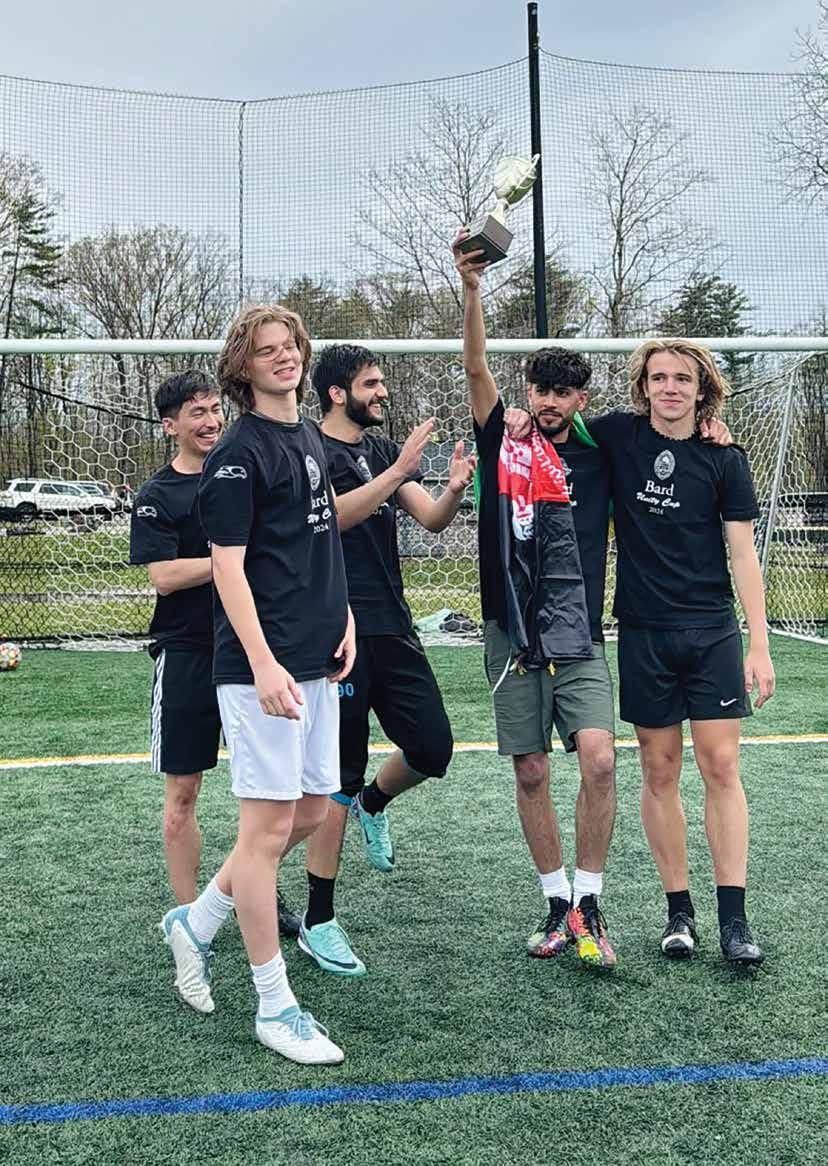

Iam Dean of International Studies at Bard College, directing study abroad, tuition exchanges, and international student scholarship programs. In 2021 I established and led Bard’s Afghan Student Transition Team. I am an active member of the Forum on Education Abroad, received a Fulbright International Administrators award, and I have worked at Hunter College, School of Visual Arts, and SUNY Ulster Community College.
I began to work with students from Afghanistan shortly after Bard announced our scholarship pledge. In August of 2021 I launched a google form to collect information about those who would be interested to apply. The form got 487 responses between August 25 and October 19, 2021. We then launched a Humanitarian Application through the Office of Admission and received over 1,000 applications. I read these applications and coordinated the admission process for those who were awarded scholarships. We used WhatsApp to coordinate visas and travel. I have not been as involved with the Ukrainian and Russian students, though I’m glad they are here.
We had to learn a lot, but working with the students who were awarded a place at Bard has been one of the most rewarding aspects of my career in international education. Sometimes it is challenging and vexing, but that is where the learning happens, on both of our sides. I feel like I am talking to the future, and this gives me hope. It is also incredibly humbling to reconcile the loss and responsibility to family that many of these students strive to balance with the demands of college.
We had to navigate through so much uncertainty with each cohort of students that arrived on campus. We did not know if visa interviews would be successful, we did not know when the International Organization for Migration would approve travel, and we were unsure about how health insurance and other benefits would travel across state lines. We asked a lot of our colleagues across campus and every office rose to the challenge of finding solutions for these students.
I believe that those who have experienced displacement brought about by extremism, political instability, climate change, or terrorism are the people who will develop solutions that lead our planet toward survival. The past, present, and future coexist in the classroom when the perspectives of re-located students are part of the discussion. The future has arrived on our campus, how fortunate we are.
I recall sitting at home one evening, reading through applications. So many stories of deserving people desperate for a meaningful next step in their lives. It was overwhelming to know we could win. I developed a profound respect for human rights organizations and the young people they protect. It was difficult
to not be able to offer the safe next step, to not be able to provide refuge to all who asked; and yet to read the details of why so many talented and vibrant youth needed sanctuary. In a workaday life that included other responsibilities, I struggled to comprehend the specifics of harm presented in spreadsheets that were urgent and shorthand pleas for rescue.
It was thrilling to meet the first group of seven students at Bard in November of 2021. At least two students recognized one another from their evacuation flights and they had a mini reunion on their first day on campus. It was incredibly rewarding to meet the people who had been named on a list and one of so many students on the other end of a WhatsApp text. We have welcomed refugee students every semester since the fall of 2021–six semesters when Bard has enrolled students. In the fall of 2021 we had 7 students arrive on campus and, each semester since then the numbers have grown and the immigration statuses have changed. In August 2023 we welcomed the most students due to the inclusion of Ukrainian and Russian emigrés. We have about 118 students at Bard, and about 9 alumni. My experience throughout the process in one word would be “inspiring.”
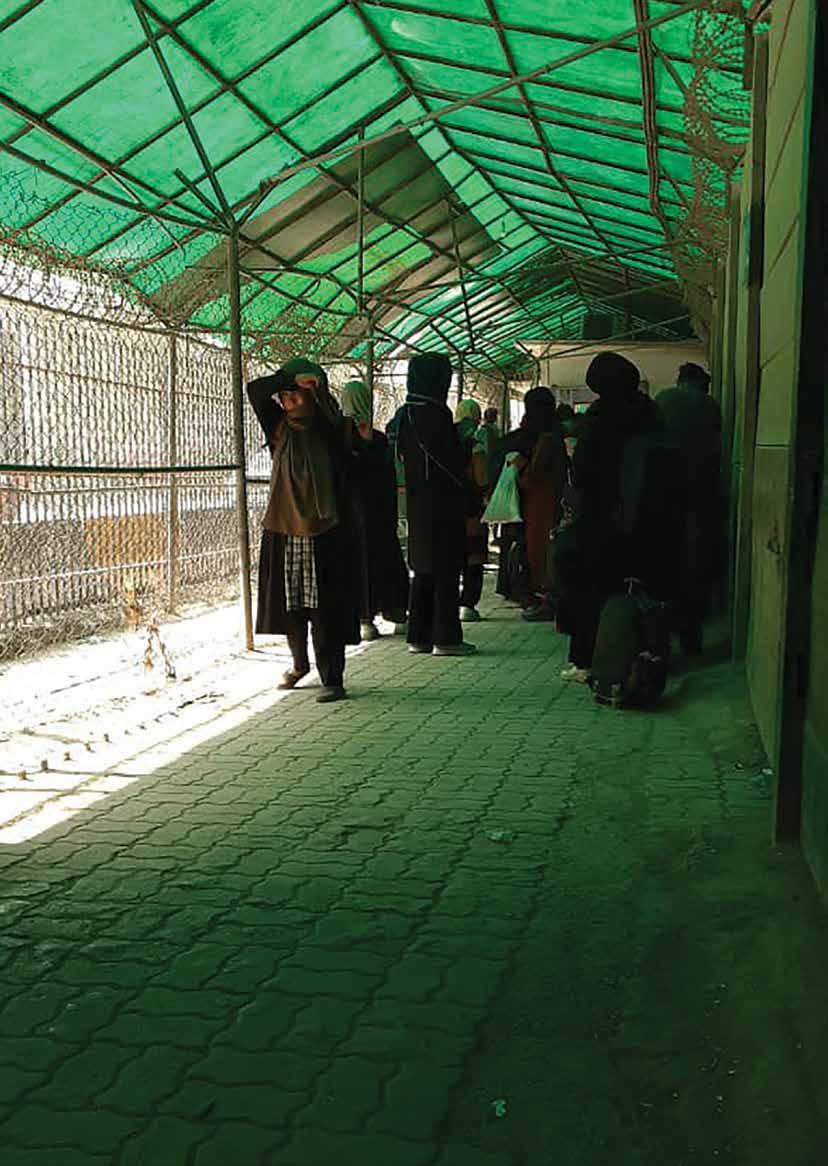
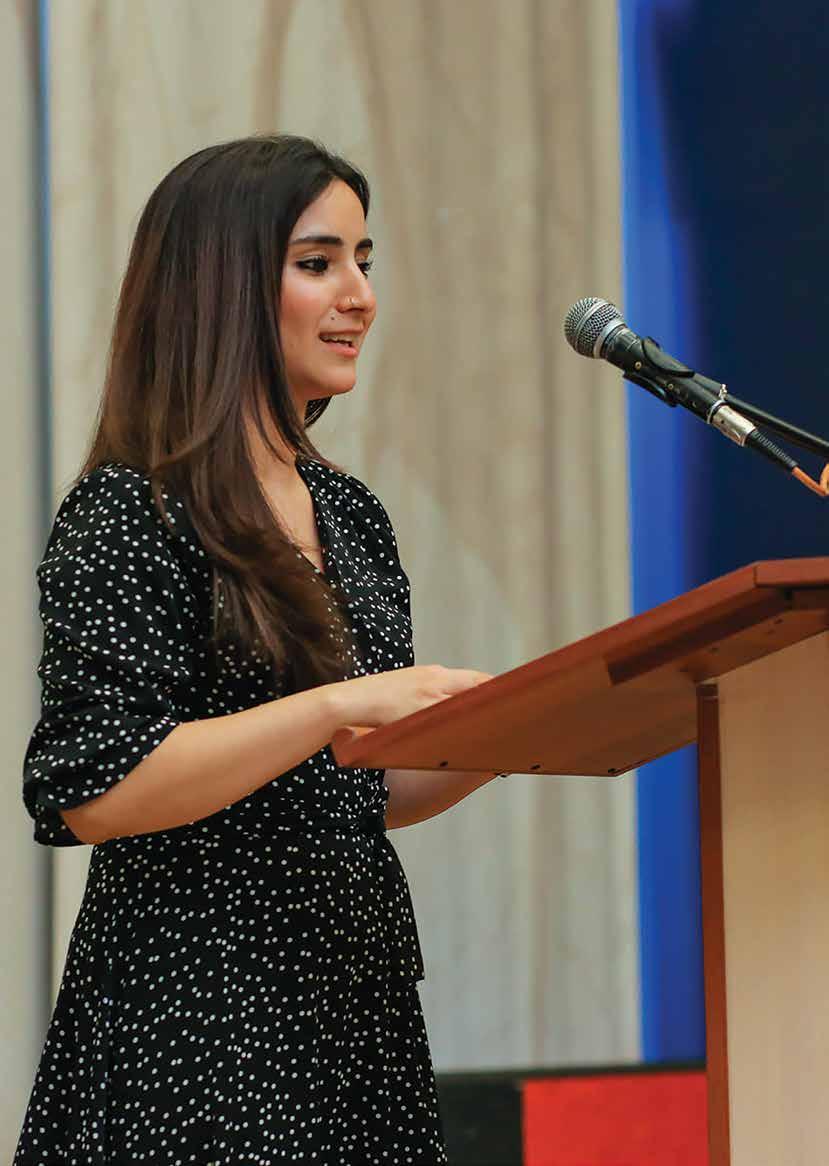
don’t really remember much about how it all started. It was chaotic. The night before Kabul fell I had a phone call with the head of the Crisis Rescue Unit (CRU) Mr. Stanikzai. I knew him because when I was in Kabul, my sister and I were doing the research for a documentary on CRU for Netflix. They were well aware of the situation, the deals and everything that was happening. It was early in the morning of the day when Kabul fell and I I called Mr. Stanikzai to ask how things were. He told me the government would fall tomorrow; we talked for about an hour. His voice was very heavy, as if he was controlling himself to not cry. I couldn’t stand anymore after the call was over. I sat down on a bench. I went to Instagram and my sister posted a video of the Afghanistan National Army, a group of them walking away from the battlefield without their guns, which were now in the hands of the Taliban. Somehow, I was still able to hold it all in.
I remember, even during those days, I had a feeling: Kabul will not fall, everything will be okay, and I can go back soon and see my family. I would Zoom with my family every night and speak with them. That night when the Taliban arrived at the entrances of Kabul, I saw the news. The whole family joined a Zoom call as usual. We took a few deep breaths and we all started talking about our days because we have been living in different countries for work and education. That night, the feeling of “everything will be fine” was gone in all of us. I think that is what was going on in every house in Afghanistan that night. The next day President Ashraf Ghani left the country along with his assistants and other close allies. The country turned into a total mess, the situation at the airport was the same as what happened in the last days of the Vietnam War. The pictures and videos were just like the scenes in Saigon in 1975 and maybe even worse than that. By August 30th, all US forces, as well as other countries’ military forces left Afghanistan and the Taliban took complete power, freeing all their prisoners right away.
Jonathan Becker was the one who first proposed the idea of doing something and doing it immediately. I remember before the whole country fell I was added on a Zoom call on Google Calendar. The call was with the AUCA president Dr. Jonathan Becker, development office at AUCA, International Students office, Finance office and a few others. During the call the discussion was about getting the AUCA students and AUAF students out of Afghanistan as soon as possible. I was so hopeless those days that I honestly didn’t believe we would be able to do anything for anyone.
I think the commitment of our team, a month with very little sleep, putting this mission as our top priority, the bravery of all students, the help from governmental sectors like the Ministry of Foreign Affairs of Kyrgyzstan, our resilience, and the generous financial support of OSF and OSUN made this evacuation and relocation possible.
My worst memory from the evacuations was when I got a call from one
of the students saying the Taliban had started whipping and beating the students and others at the border. They sent me some photos and videos. I couldn’t watch them. I just deleted the photos and videos on the spot and put my phone away and got out of my apartment. Our students in that group couldn’t cross the border that day. They all went back to their homes hopeless. Some of them had come to Kabul from the provinces. For them it meant going back to their provinces for a couple of days at least. That was the moment I was feeling very down and out of energy.
The happiest moments were when the first group of our students crossed the border and made it to Pakistan. We thought “We did it and we can get all the students out now.” The second happiest moment was when the first group of students arrived in Bishkek and were picked up at the airport by our colleagues from the International Students Office.
Now that our students have made it out of the country, we need to make sure we can help them in the next steps as well. There is no way they can go back to Afghanistan. At least not now. There is a great need for finding funding resources and making sure the students are getting the support they need in securing further fully funded academic programs or finding jobs.
If I could describe my experience throughout the evacuation process in one sentence I would say it was a very long, scary, exhausting, yet exciting roller coaster ride.
At the end, I want to dedicate a poem by Mario Benedetti to all the people who made this mission possible and thank them for being the kind of people that I like:
The People I Like
I like the people who vibrate.
The people who you don’t have to push and tell them what to do. They know what needs to be done and do it.
The people who cultivate their dreams until those dreams take on their own reality. I like the people who have the capacity to measure the consequences of their actions.
The people that risk the certain for the uncertain when chasing a dream. Who allow themselves to get away from sound advice leaving the solutions in the hands of God.
I like the people who are just with their peers and themselves.
The people who are thankful for every new day and for the good things that exist in their lives, who live every hour with a good spirit, giving the best of themselves, thankful for being alive, for being able to give away smiles and to offer a helping hand without expecting anything in return.

I like the people who have the capacity to criticize me, constructively and to my face, but without hurting or wounding me. The people who are tactful. I like the people who possess a sense of justice. It is they who I call my friends.
I like the people who know the importance of joy and practice it. The people who through joking teach us to live life with humor. The people who in this sense, never stop being child-like.
I like the people whose energy is contagious. I like the people who are frank and sincere, capable of opposing the decisions of anyone with reasonable argumentation.
I like the people who are faithful and persistent, who don’t give up when it comes to reaching objectives and ideas.
I like the people with criteria, who aren’t ashamed of admitting when they are wrong or when there is something they don’t know. The people who, after acknowledging their mistakes, genuinely strive to not make them again.
The people who fight against adversities.
I like the people who look for solutions.
I like the people who think and meditate internally.
The people who value their peers not because of a social stereotype or how they look. The people who don’t judge or allow others to judge them.
I like the people who have personality.
I like the people capable of understanding that the biggest mistake a human being can make is to try to take away from his mind that which won’t leave his heart. Sensitivity, courage, solidarity, kindness, respect, tranquility, values, joy, humility, faith, tact, confidence, hope, appreciation, wisdom, dreams, regrets, self love and love for others are all fundamental in order to be called PEOPLE.
I am committed for the rest of my life, for anything, with people like these. Just for having them with me I’m well remunerated.
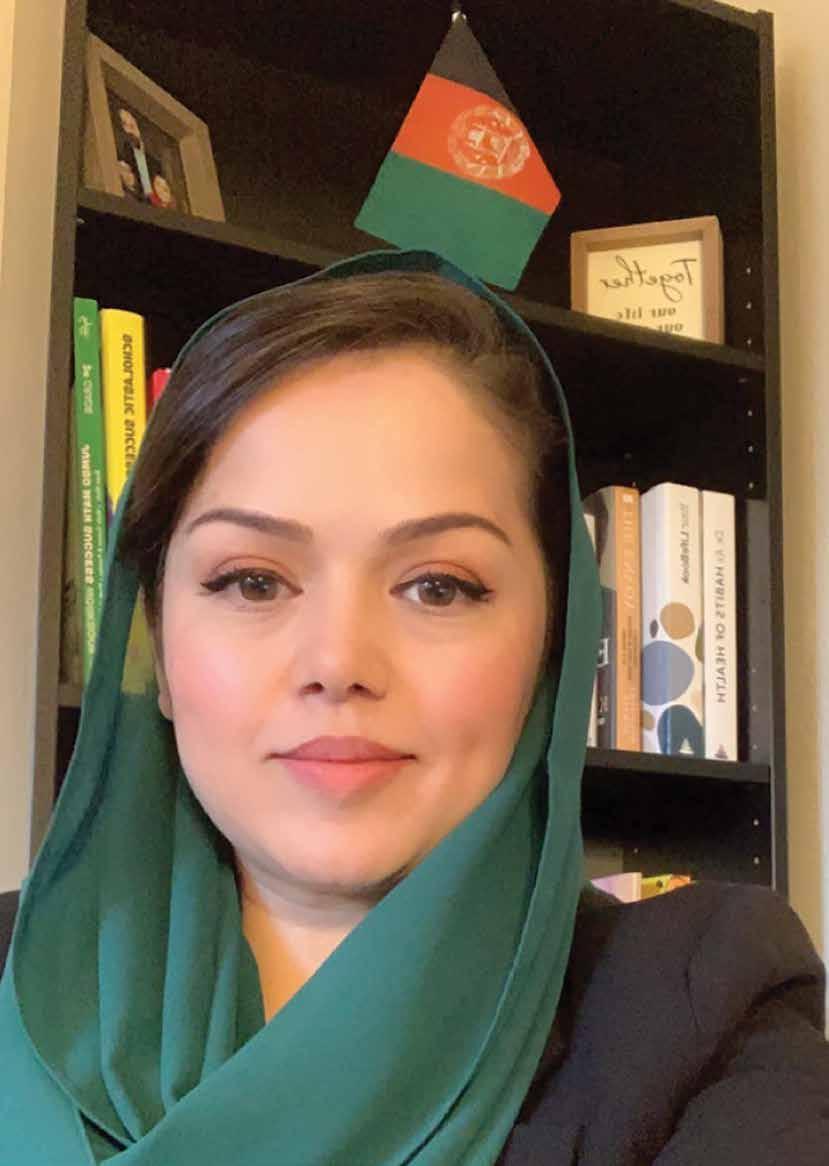
Istarted working with the first cohort of Afghan students in January 2022 as a consultant. It’s indeed very important for me to work with these relocated students. When I was given the chance for this role, a flood of happiness and excitement overwhelmed me. The connection with the students was deep, touching the very core of my own past. These young souls came from Afghanistan, just like me, sharing the same roots that once anchored me as a student grappling with the trials of life in a foreign land, far from the comforting warmth of family.
Beyond our shared heritage, we carried a common burden – the collapse of our government. Unable to directly ease the hardships faced by my fellow Afghans back home, guiding and assisting these students became a heartfelt calling for me. It was an opportunity to share insights, provide support, and bring a small ray of comfort to those facing the same challenges I had once endured.
In embracing this role, it meant more to me than just a position; it became a calling to fulfill my duty to my people. Assisting these students through their struggles wasn’t just a task; it became a wellspring of profound joy and happiness. It was my way of contributing to the well-being of my fellow Afghans and making a positive impact in their lives
I witness an exceptional group of resilient and highly talented students seamlessly acclimating to their environment, achieving remarkable milestones in academics and sports, all while actively spearheading significant projects to support education for their fellow Afghans back in Afghanistan.
I extend my deepest gratitude to Bard College and all the compassionate individuals who played an integral role in the process of evacuating Afghan students and welcoming them to Bard College. In particular, I would like to express my heartfelt appreciation to Vice President Jonathan Becker. His unwavering commitment and tireless efforts on behalf of Afghans and Afghan students resonate profoundly, and I find myself genuinely grateful. I cannot thank him enough for the compassionate actions that have made a significant impact during these challenging times. The warmth and generosity extended to those in need are a testament to the kindness that defines Bard College and its dedicated community.
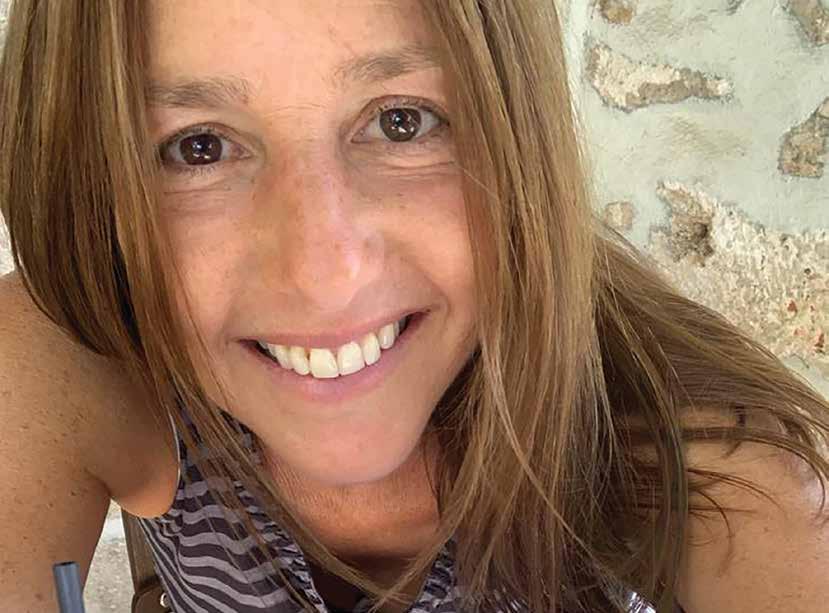

Icame in as the Associate Dean of so-called displaced students, which means I am in charge of advocating for, and taking care of (as much as I can) and raising money for the Afghans, Ukrainians and Russian students on scholarship here at Bard.
Before all this I was a journalist for nearly 30 years, covering Africa, and Europe, Latin America and a lot of the Middle East. I spent several months in Afghanistan, years ago, writing some magazine pieces – and that is when I made connections and friends who later, when the Taliban took over and they needed some help, pulled me into evacuation and refugee work. Starting in August 2021 and for close to two years, I worked, with a small group of friends, on evacuating Afghans I knew (and then later those I didn’t even know) out of the country and finding them safe havens in Canada and the US.
During this period I was in touch with Jonathan Becker, who, of course, was doing parallel and similar work with the Afghans Bard was working to evacuate. Jonathan and I, and others in this space, would touch base, share information and try to help each other:How did you get passports? Where is the best border crossing? Is the UAE accepting more refugees? Do you have any good places to stay you can share in Islamabad?
Two of the Afghans I had helped evacuate actually got into Bard. I basically followed them and decided to join the college myself in this newly created job. It’s totally new work for me, and there are days I miss journalism and travel and freedom, but I love it here, and I have come to understand clearly that helping people relocate and even helping them get visas and resettle is only, really, the beginning of a longer journey of them finding their way in a new world. I like being a part of that continuing journey. I am learning a lot.
I like challenges and I like steep learning curves and this job has been all of that. I felt one of the things I wanted to do here was to foster a sense of community amongst the students I was charged with taking care of, or at least give them that option of community if they wanted it. Many of these students do not have family in the US and I feel that, as such, a little extra love, attention and guidance goes a long way. This became especially clear over winter break when a good number of the students had nowhere to go, so we all stayed on campus together. What could have been a really bleak period over dark and snowy January ended up feeling like camp: We went ice skating, and bowling and had movie nights over at my place. We cooked together, did puzzles and generally got to know each other better. It was very satisfying. And we laughed a lot.
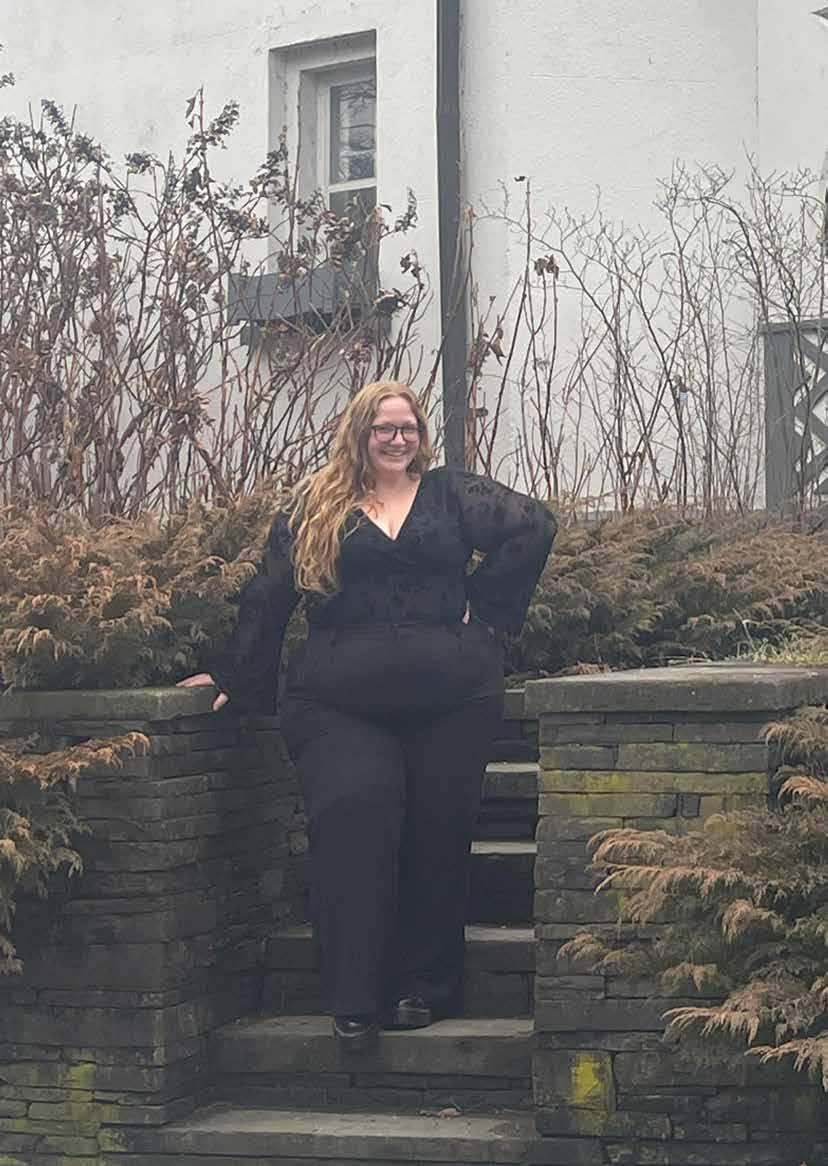
Igraduated from Bard College in 2020 with a degree in Human Rights. That same year, I began working with Bard’s Health Services as part of the college’s Covid-19 response efforts.
Shortly after the announcement of the college’s Afghan Student Initiative, I was brought on to the Afghan Student Transition Team to provide support as students acclimated to life in the US and at Bard. The first Afghan students were welcomed to campus in the Fall of 2021. Since then, we have welcomed four cohorts of students from Afghanistan to Bard. In the Spring of 2023, my role evolved to include supporting the various needs of students from Ukraine and other Eurasian countries in addition to those from Afghanistan.
As of January 2024, Bard has welcomed approximately 130 Afghan, Ukrainian, and Eurasian students – 120 of whom are currently enrolled, and 10 recent graduates. I have had the privilege of working with each one of these students in some capacity during their time at Bard.
My experience working with Bard’s relocated students has been immensely rewarding. Each student has a unique story and perspective that enriches Bard’s classrooms, clubs, and overall community. The highlight of my work day is always when I get to see and interact with these incredible students.

Istarted working at Bard College in Feb 2022 for the Center for Civic Engagement. One of my assigned duties is to oversee the interns for our initiative. Many international students find their way to the CCE seeking meaningful work and community. When a student becomes an intern for the CCE, they really do enter a community of sorts. As they build a relationship with us, we become part of their support system at Bard. I had the privilege of working with many Afghan students over the past two years, but two students come to mind who gave back to the community as much as they received. They are Naseem Nazari ‘24 and Rukhsar Balkhi ‘23. Naseem stands out as a student leader on campus, I have seen how students (and not just Afghan students) come to him to lean on him for support. He is filled with goodness and is a national treasure. Rukhsar amazed me with her ability to take charge and take an idea from concept to action. One more intern that I had the privilege of working with is Valeriia Rasheva ‘26 from Russia. If I ever met a person who matches my own yes-energy, it is Valeriia. Aside from her beautiful graphic design work, I love how Valeriia takes advantage of the numerous events and opportunities at Bard. She came to this college to do something and she is doing it! Some might think that my job at Bard as an administrative coordinator isn’t that glamorous. And that is fine, because I know just how great it is and part of that greatness is because of the people I get to work with and interact with - especially our students!
This Book was put together thanks to the collaboration of:
Heram Amiri, Senior in Economics and Global & International Studies, Bard College
Bonnie Goad, Director, OSUN Program Development & Communications; Associate Director, CCE
Terry Roethlein, Communications Manager, OSUN, Bard College
Caitlin O’Donnell, Program Manager, Civic Engagement Initiative, OSUN, Bard College
Valeriia Razheva, Graphic Designing Intern, Civic Engagement Office, Bard College
Special thanks to the following people and organizations for making the relocation possible
Afghan Future Fund
Aidai Anvarbek Kyzy
Aidai Sarykueva
Aikanysh Imanova
Aizhamal Dzhanibekova
Aizhana Dzhumalieva
Akylai Mukarbek Kyzy
Alex Soros
Andrew Moore
Andrew W. Mellon Foundation
Anna Kim
Arezo Kohistany
Arni Arnthorsson
Asel Sydykbaeva
Aselia Umetalieva
AUCA Development Office
AUCA Public Relations Office
Bard Center For Civic Engagement
Bendetta Roux
Bermet Tursunkulova
Bonnie Goad
Bryan Billings
Caitlin O’donnell
Celine Carbullido
Chingiz Shamshiev
Cholpon Turdalieva
Christopher Baker
Colman Joyce
Danna Harman
David K. Lakhdhir
David Sedny
Education Above All
Ehsan Achekzai
Elena Kosterina
Emily Martinez
Erik Black
Erin Cannan
Florian Becker
Galina Gorborukova
Gulzada Kochokova
Ian Bickford
Ilari Könönen
Ilias Suvanov
Indira Sagynova
Jennifer Murray
Jibek Toichubekova
Jonathan Becker
Jose Roberto
Jumakadyrva Gulsana
Kamila Mateeva
Leon Botstein
Marion Detjen
Matt Trevithick
Nazgul Koilubaeva
Nurgul Ukueva
Omar Waraich
Open Society Foundation
Open Society University Network
Roope Ruokonen
Saltanat Rustembekova
Sarah deVeer
Schmidt Futures
Stephanie Hausotter
Suhailla Khyber Jalali
Tamo Chattopadhay
Tatiana Orlova
Umut Kydyrgychova
Vance Serchuk
Vitess Del Prete
Yalda Hakim
Yasin Yaqubie
Zahid Jalali
Zarlasht Sarmast
Zhamilia Irsalieva
Bard College is currently supporting more displaced students per capita than any other college or university in the United States. The Sanctuary Fund helps displaced and undocumented students by providing scholarships, room, board, and assistance with books, medical, legal, and other pressing needs; it is designed to continue Bard’s long history of supporting displaced and undocumented students and faculty who for generations have found sanctuary at Bard.
There are currently over 120 young men and women enrolled at the College who are considered “displaced students,” meaning they have been forced to flee their countries of origin, leaving behind families, friends, homes, studies, and possessions. Students range in age from 17–31, and most are pursuing undergraduate degrees. Over 75 are from Afghanistan, and over 25 are from Ukraine, and another 20 are Eurasians (mainly Russian dissidents). Bard has welcomed them with full scholarships, including tuition, room, and board. While most of the Afghan students will remain in the United States and receive asylum, many of the others are hoping to return home, if ever possible. Bard has committed institutional resources to cover these costs as students move toward graduation, yet much help is needed to fund this effort.
Support Bard Sanctuary Fund
https://bardian.bard.edu/register/sanctuary
Learn more about Bard Sanctuary Fund
https://cce.bard.edu/community/sanctuary-fund/